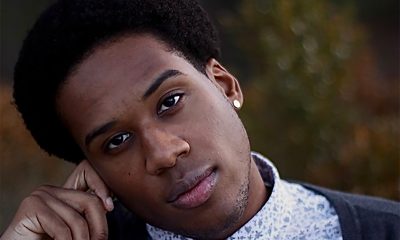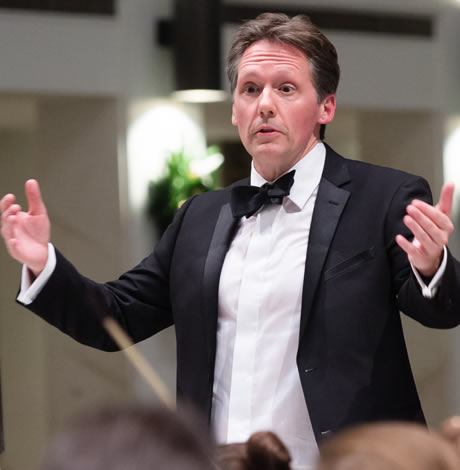Arts & Entertainment
A lasting legacy
‘Poetry into Song’ at National Presbyterian Church on March 5
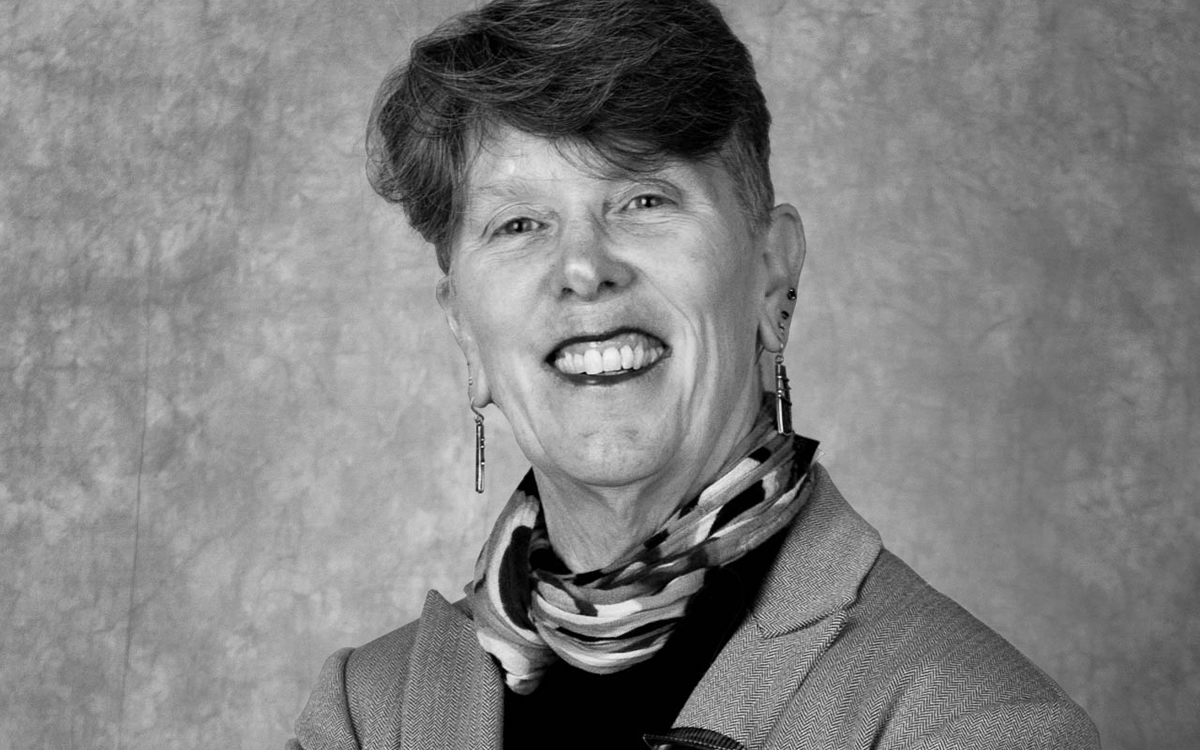
“Poetry into Song”
Washington Master Chorale
March 5 at 5 p.m.
National Presbyterian Church
4101 Nebraska Ave., N.W.
$40-60
washingtonmasterchorale.org
After 10 years as a singer and board member with Washington Master Chorale, Diane Kresh decided to end her tenure. But before leaving, she wanted to express her gratitude by gifting the group with something truly beautiful.
The result is composer David Conte’s “The Unknown Sea” a commissioned chorale piece based on the texts of famed American poet Elizabeth Bishop (1911-1979). Originally the piece was slated to end the chorale’s 10th season in 2020, but because the pandemic had other plans, it’s now debuting as part of WMC’s “Poetry into Song” on March 5 at the National Presbyterian Church.
The idea, Kresh explains, was to create a legacy project, a gift to the chorale from her for many years of making music with a special group of people including WMC artistic director and dear friend Thomas Colohan. Also, Kresh wanted to include a salute to Bishop, whose detailed yet non-confessional style she greatly admires.
Kresh’s affinity with Bishop is partly based on similarities, both gay and feminists. Also, Kresh, who enjoyed a long career at the Library of Congress, appreciates that Bishop spent a brief stint as a consultant of poetry at the library many in 1949. But mostly, Kresh loves the work of women writers, and that’s something she wants to celebrate.
Bishop knew great success, friendship and romantic love, but her early years were marked by tragedy. She was a baby when her father died, and just a few years later her mother was permanently institutionalized with mental illness. For a time, Bishop lived happily with her maternal grandparents in Nova Scotia and then her father’s wealthy parents spirited her off to New England. She graduated from Vassar in 1934.
Using inherited private income, Bishop travelled broadly and frequently. Evident from her life and work is a search for home and an interest in coasts. She lived in Brazil for some time.
When Kresh’s commission was still just a thought, she and Colohan reached out to Conte, a prolific San Francisco-based composer who has written 150 works of which 40 involved the words of poets, both living and dead. Kresh wanted twenty minutes of music based on Bishop’s words with a mezzo soprano solo built in.
Initially Conte, who is gay, wasn’t sure if he was the right man for the job. He knew of Bishop’s poetry but not well. But the deeper he dove the more excited he became. And he had no objections to Kresh’s requests, so they moved ahead.
For his new choral orchestral work, Conte draws on Bishop’s “One Art,” a widely admired poem that’s at once deeply personal yet a throwback to tradition and reserve.
“It’s about losing keys, a house, and finally losing a loved one. Increasingly, the losses become more intense,” he says. “The tone of the poem is so interesting, a quiet but confident acceptance of loss as a part of life, wry and humorous and brave all at the same time. It took me a while to penetrate the personality that’s in the poetry.”
The commissioned work is an amalgam of queer talent. When a gay composer sets the words of a gay poet, there’s no question of shared experience. Conte says “While we have more freedom than Bishop experienced, there’s still a shared oppression, feeling like an outsider, having to discover identity because yours is inexact.”
For both artistic and practical reasons, WMC is pairing “The Unknown Sea” with Ralph Vaughan Williams’s cantata, “Dona Nobis Pacem,” based on work by gay poet Walt Whitman and texts from the Hebrew Bible and Latin Mass, re-orchestrated by British composer and conductor Jonathan Rathbone.
Both Kresh and Conte will be in attendance for this long-anticipated premiere.
“I’m excited, but a little sad I won’t be singing,” says Kresh. “It’s a sometimes bright, sometimes elegiac piece that has legs; I hope other groups and audiences will experience the same kind of joy that we’ve had making it.
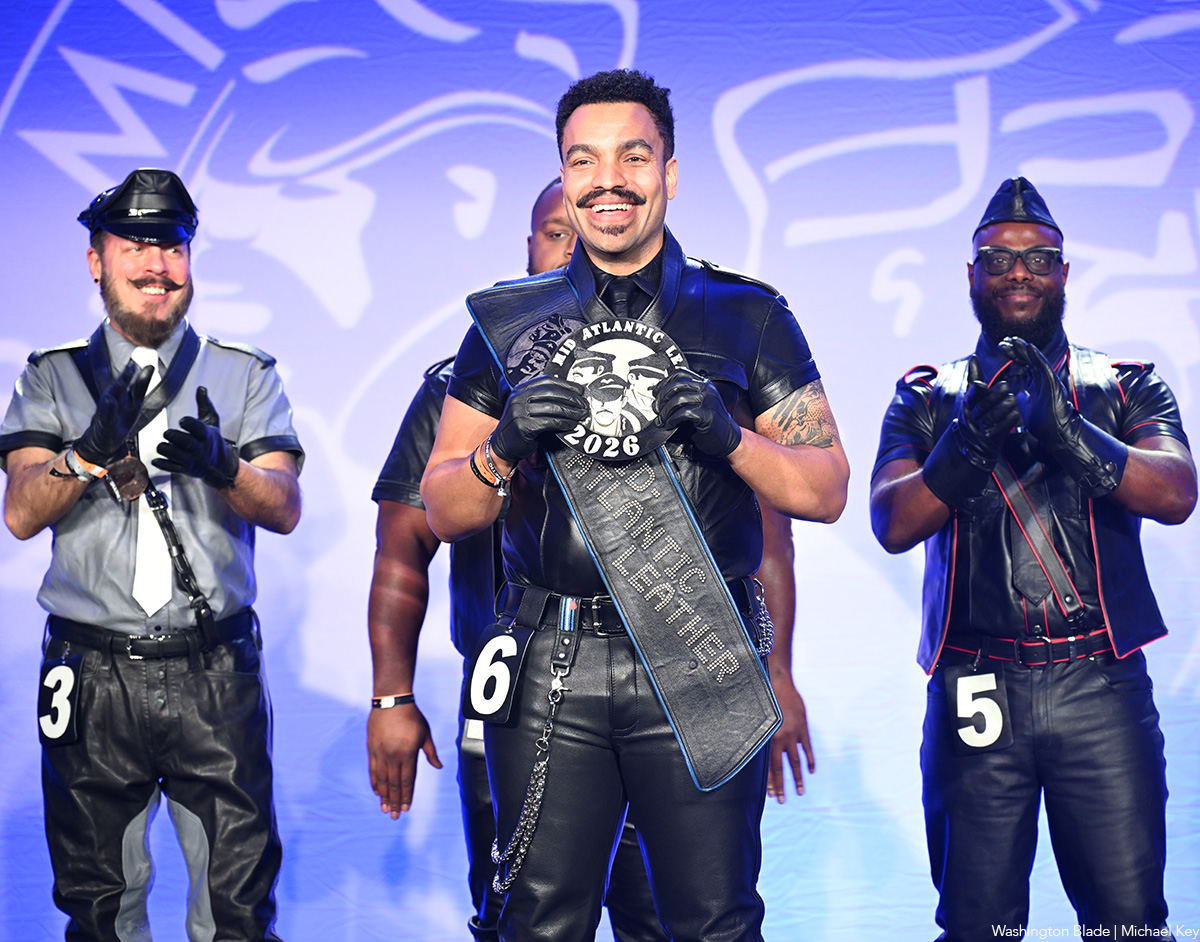
The 2026 Mr. Mid-Atlantic Leather competition was held at the Hyatt Regency Capitol Hill on Sunday. Seven contestants vied for the title and Gage Ryder was named the winner.
(Washington Blade photo by Michael Key)
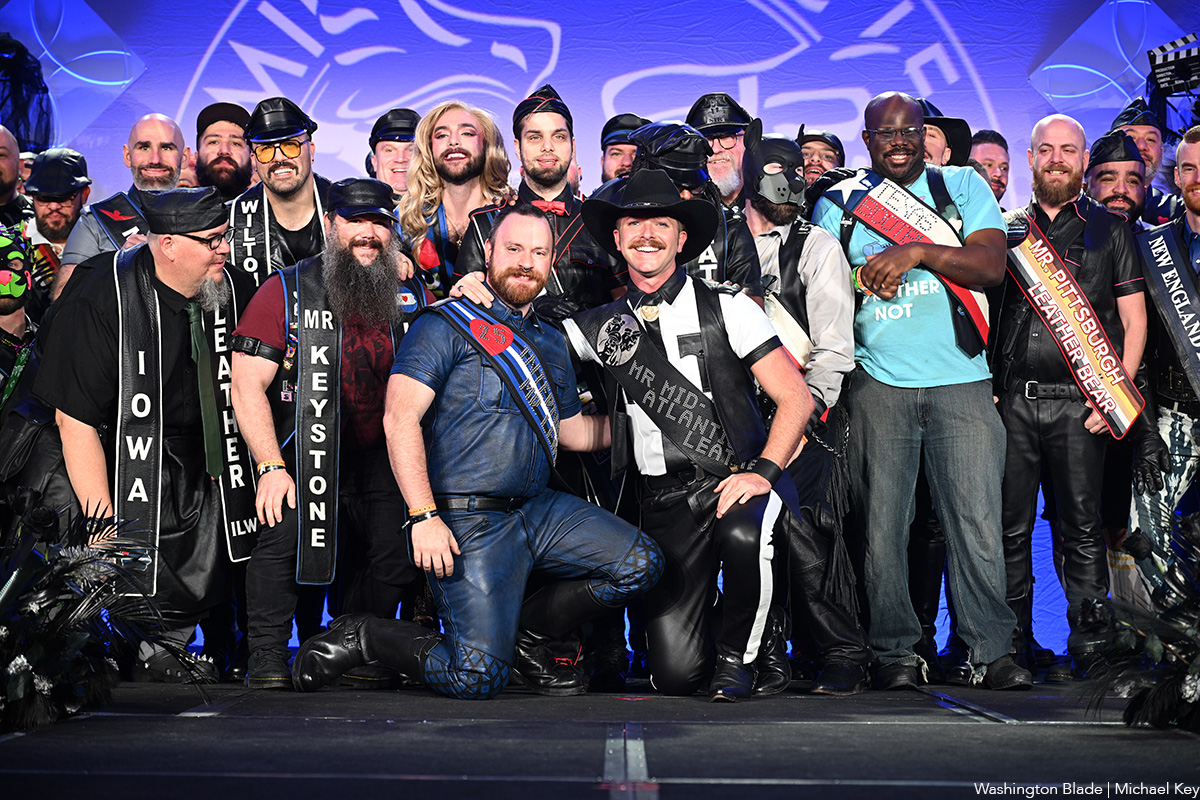
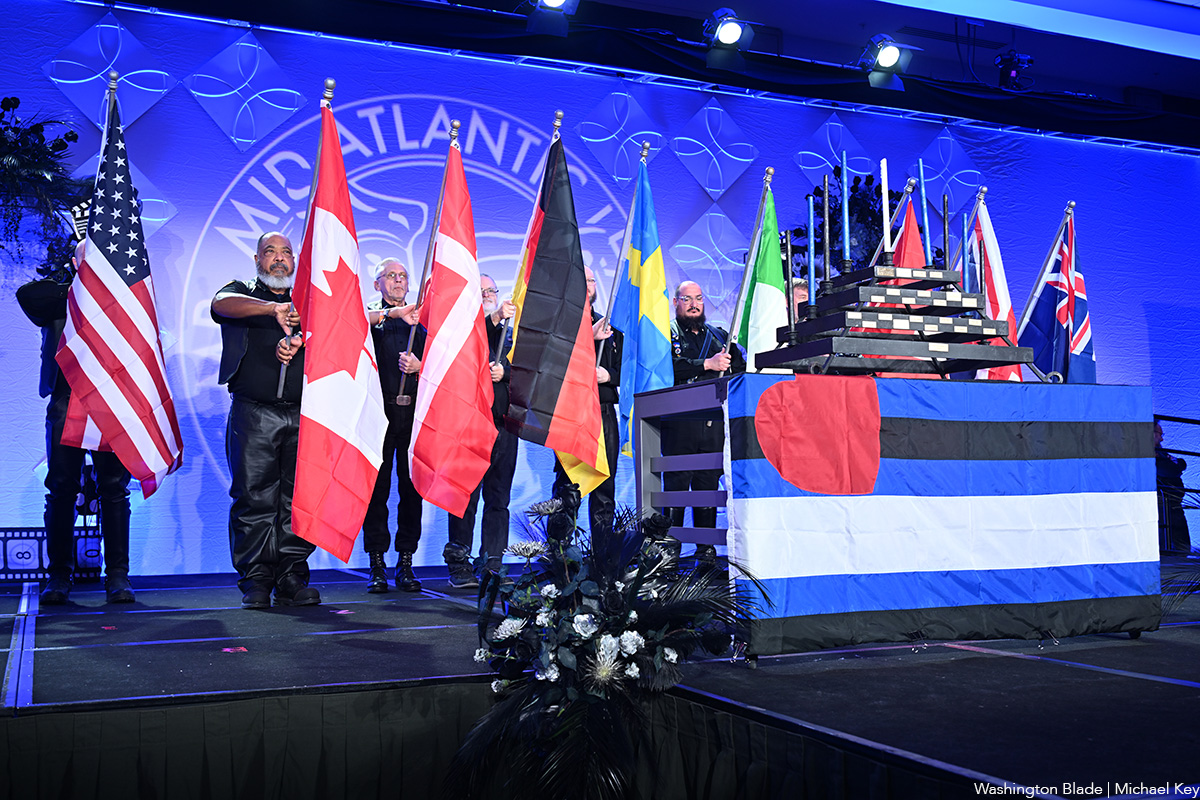
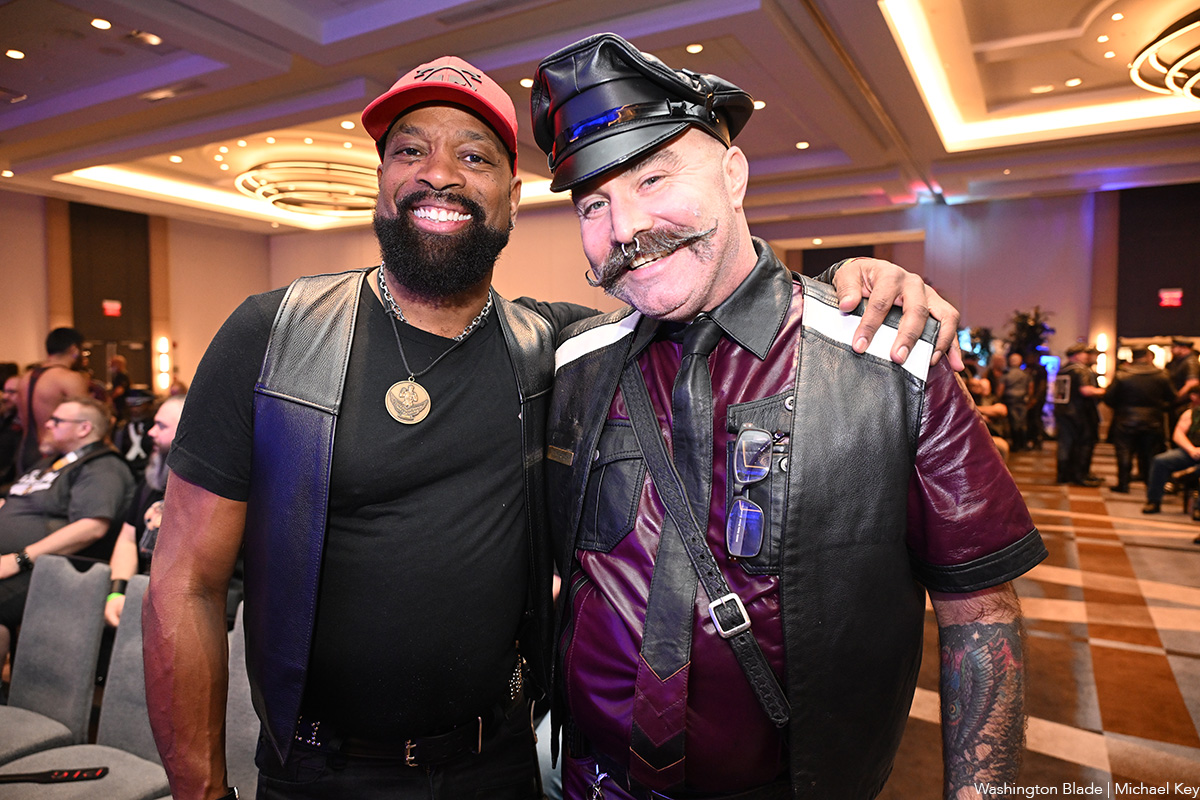
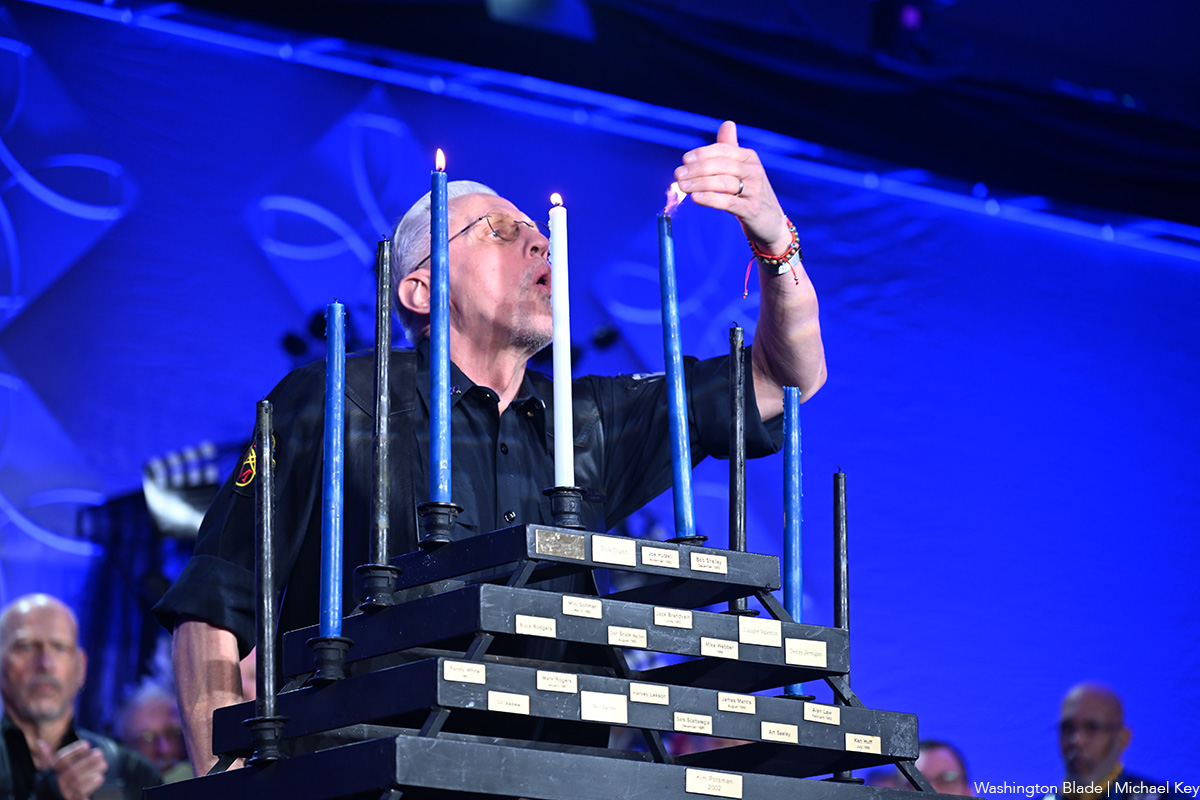
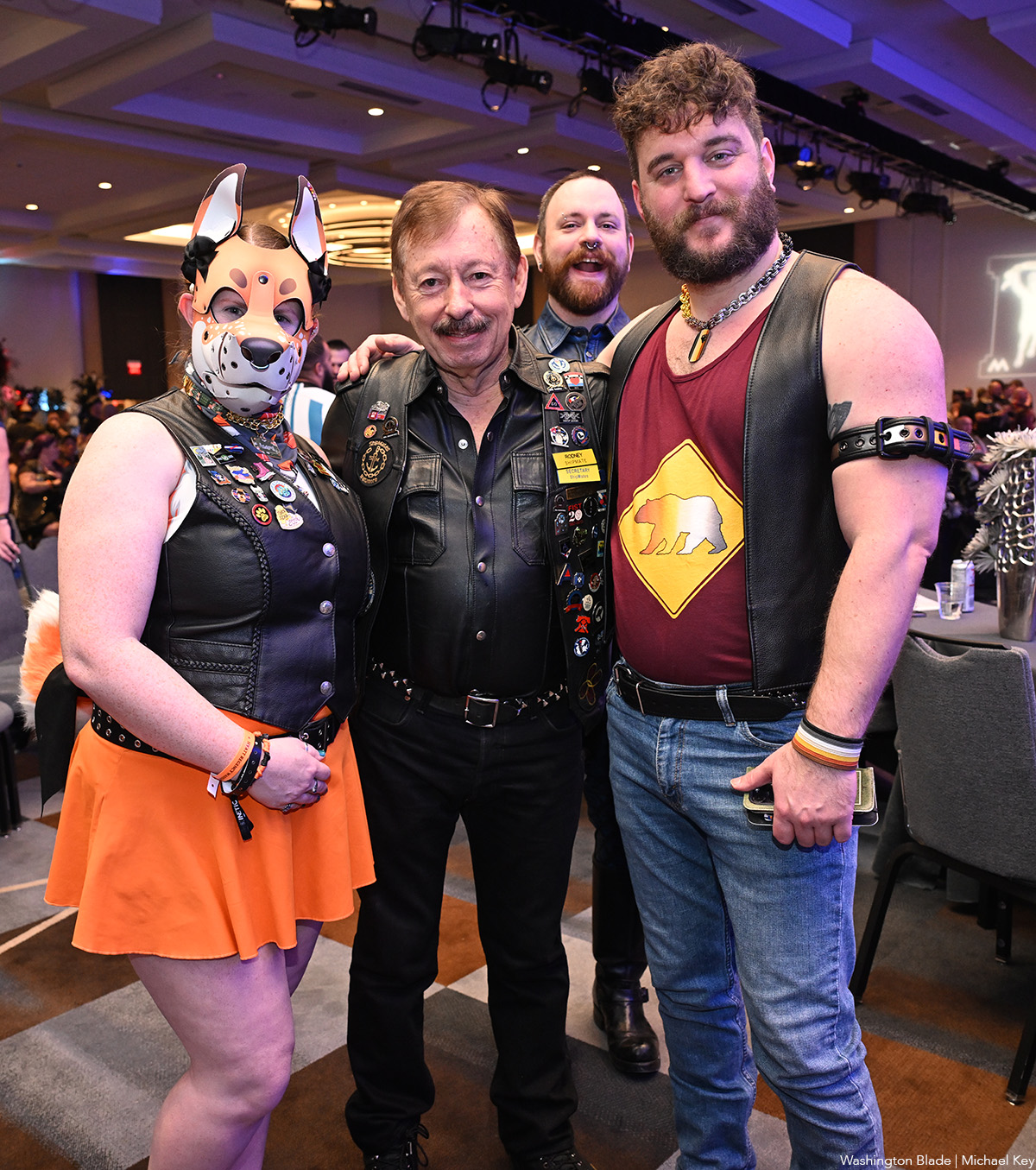
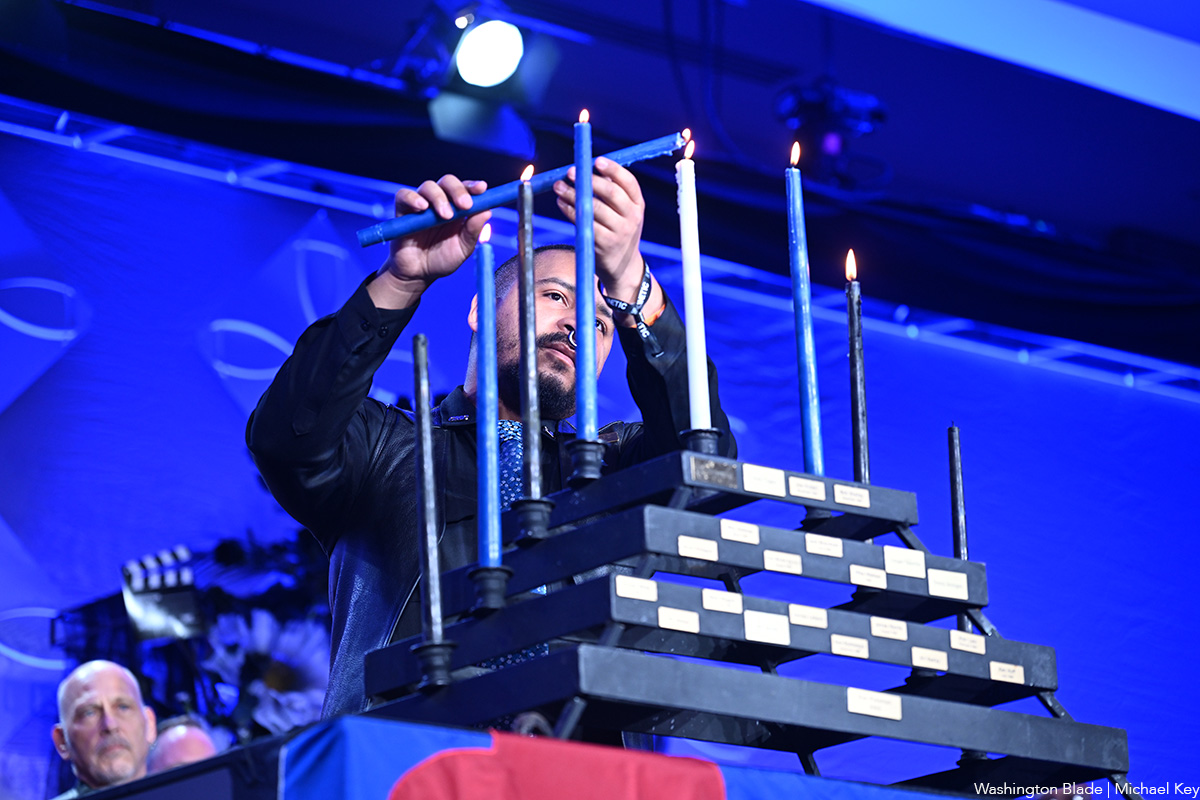
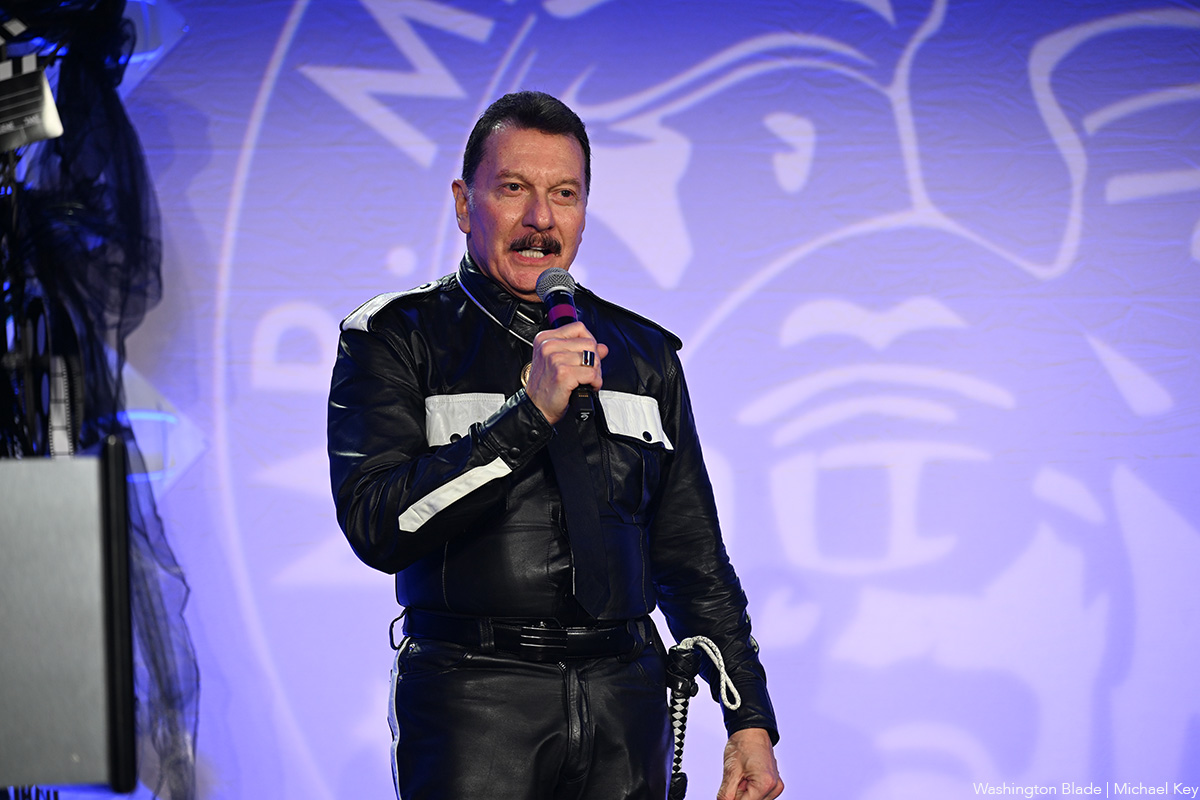
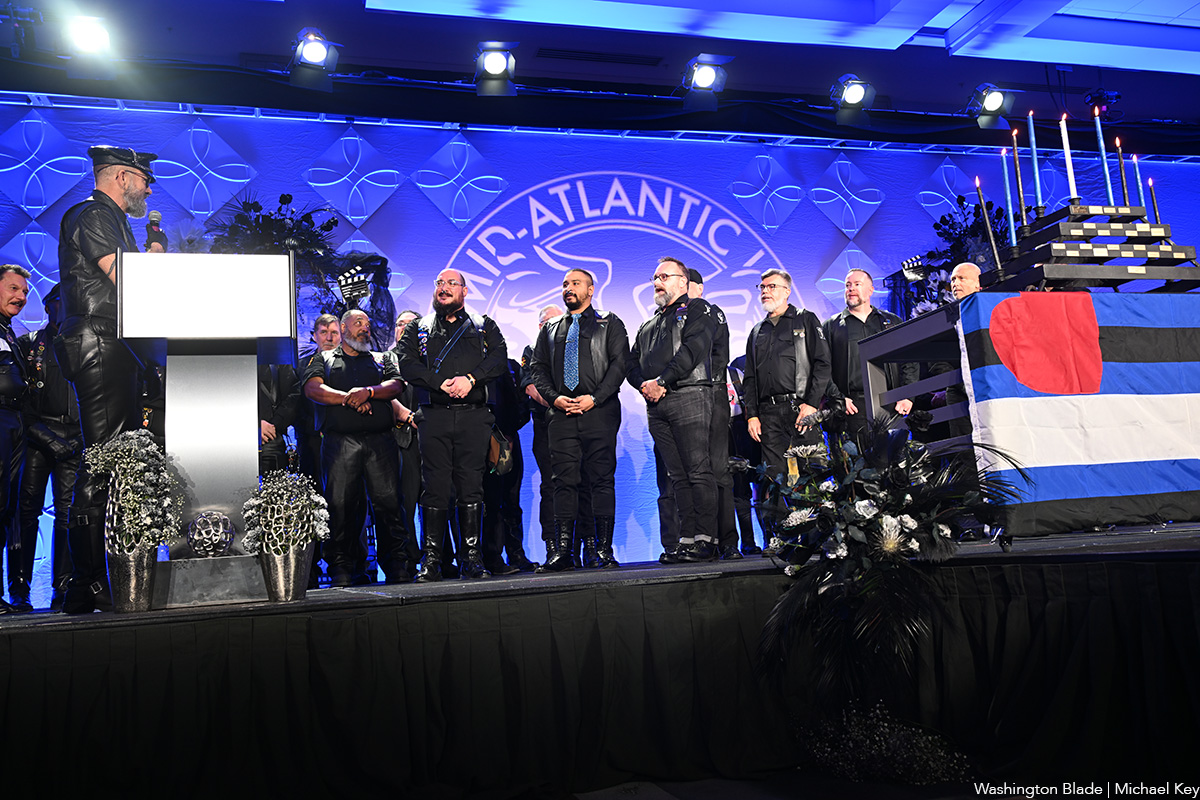
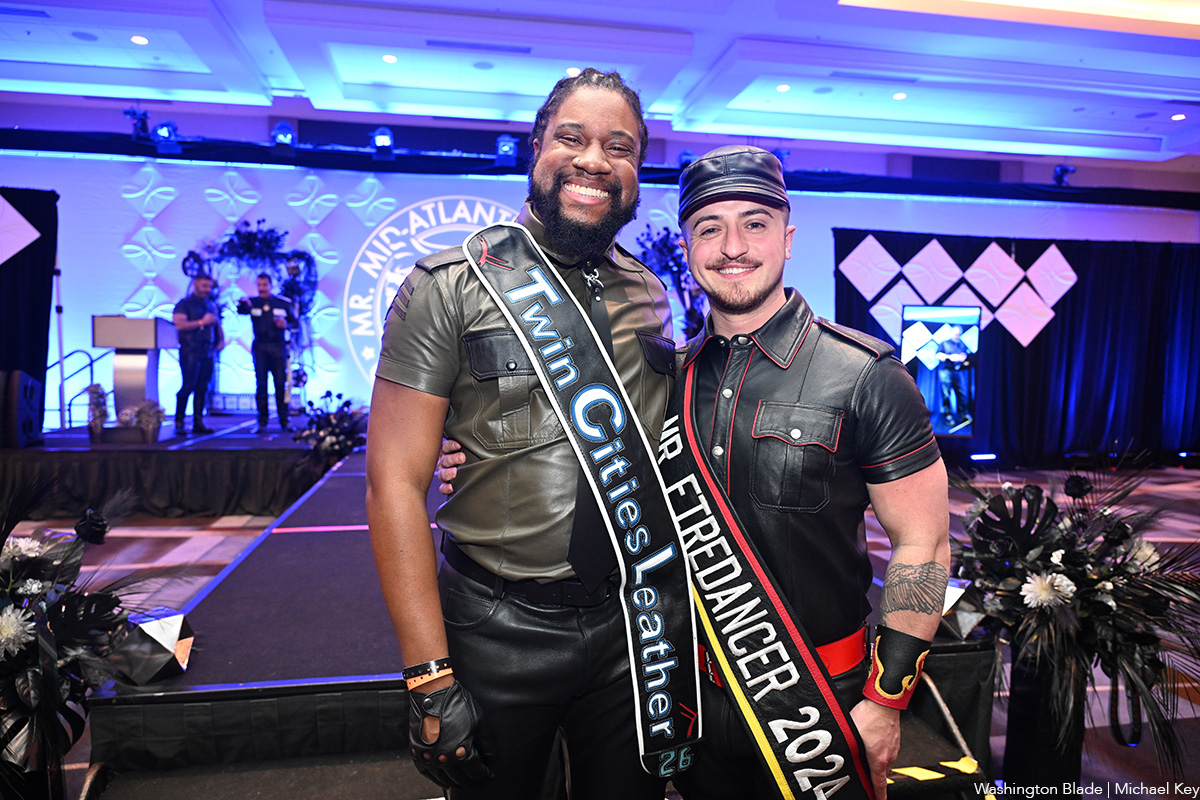
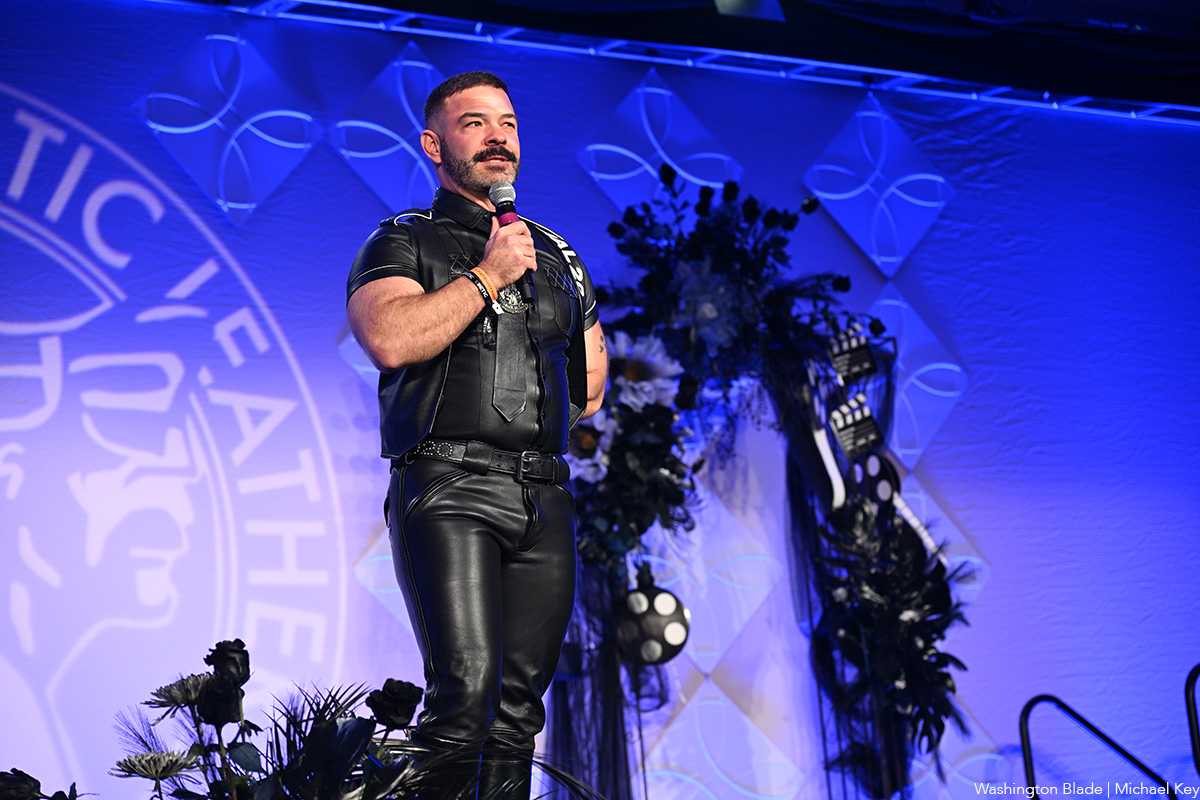
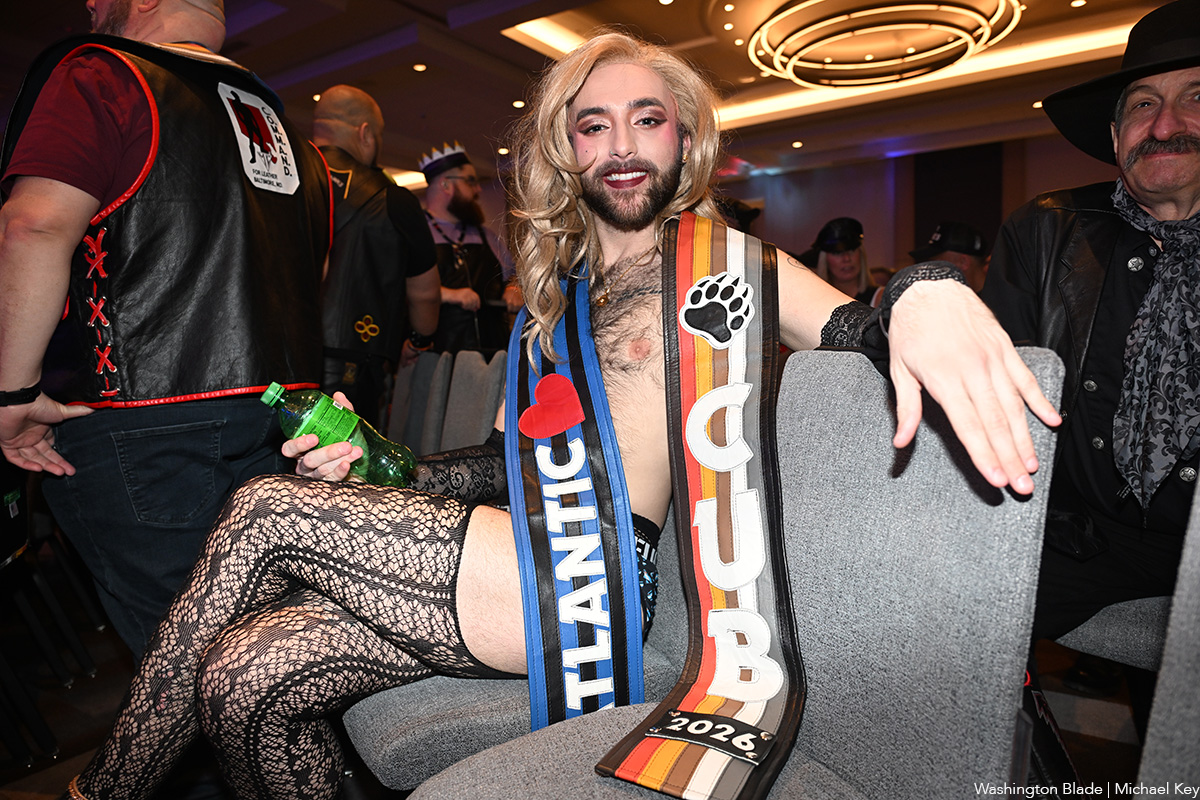
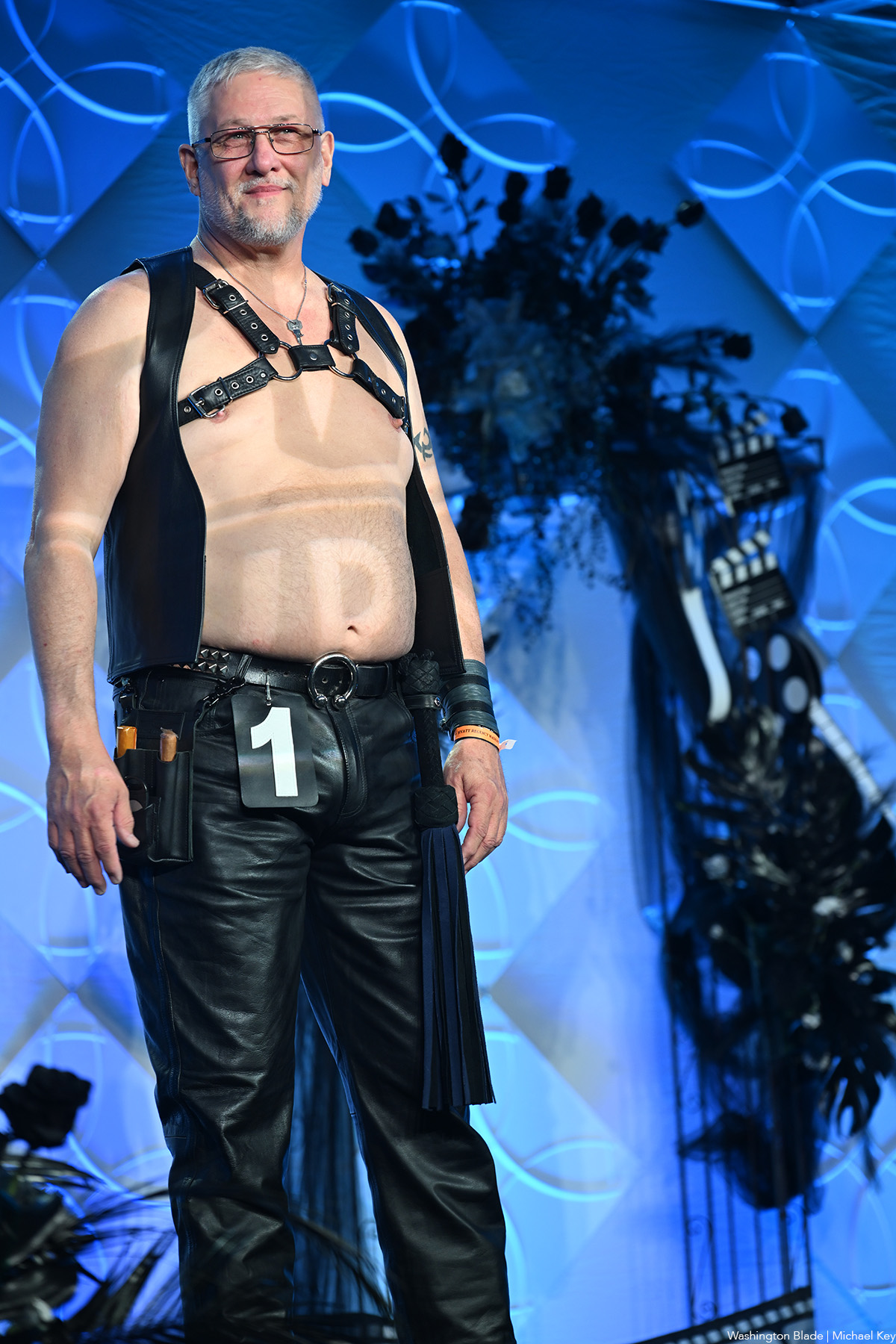
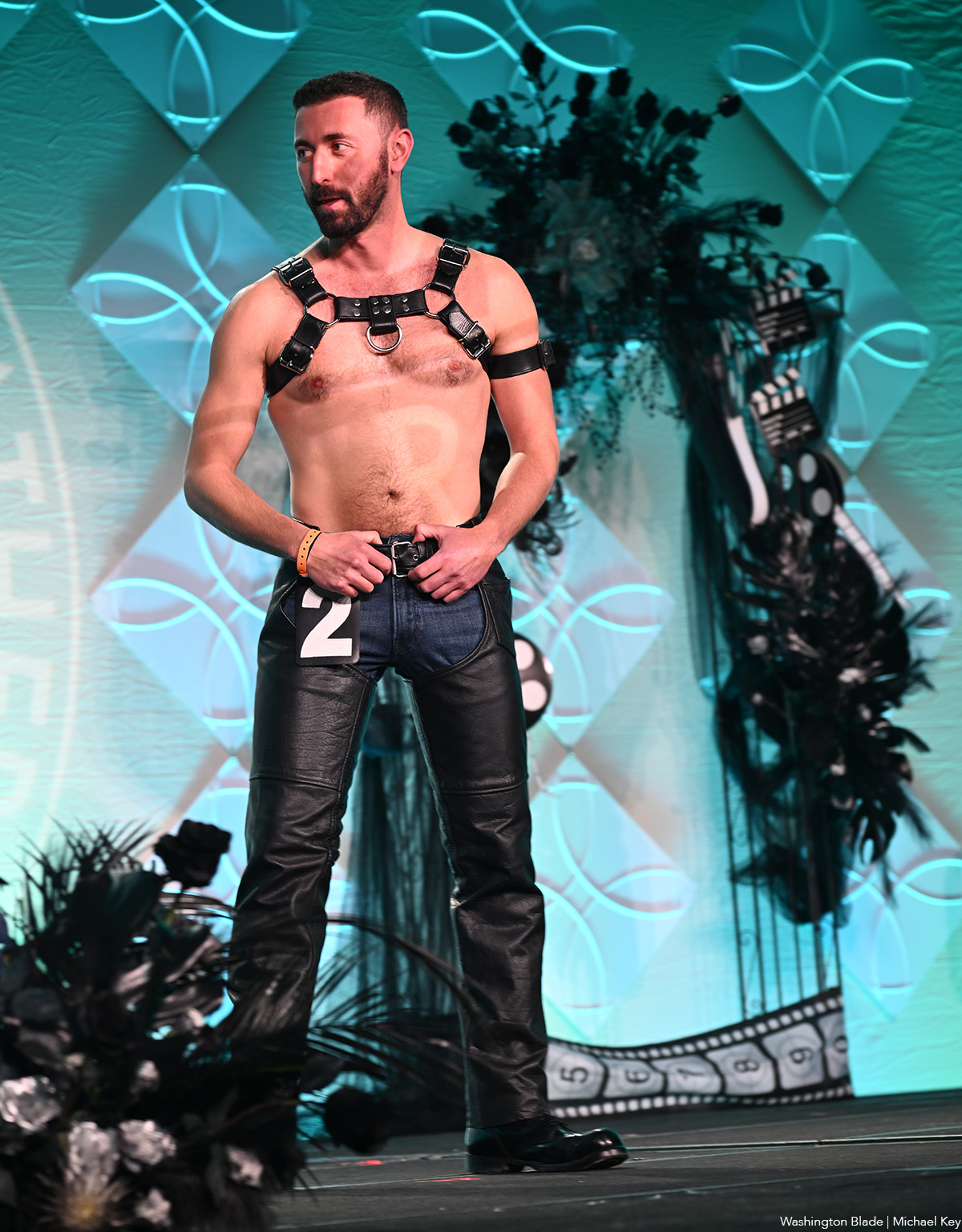
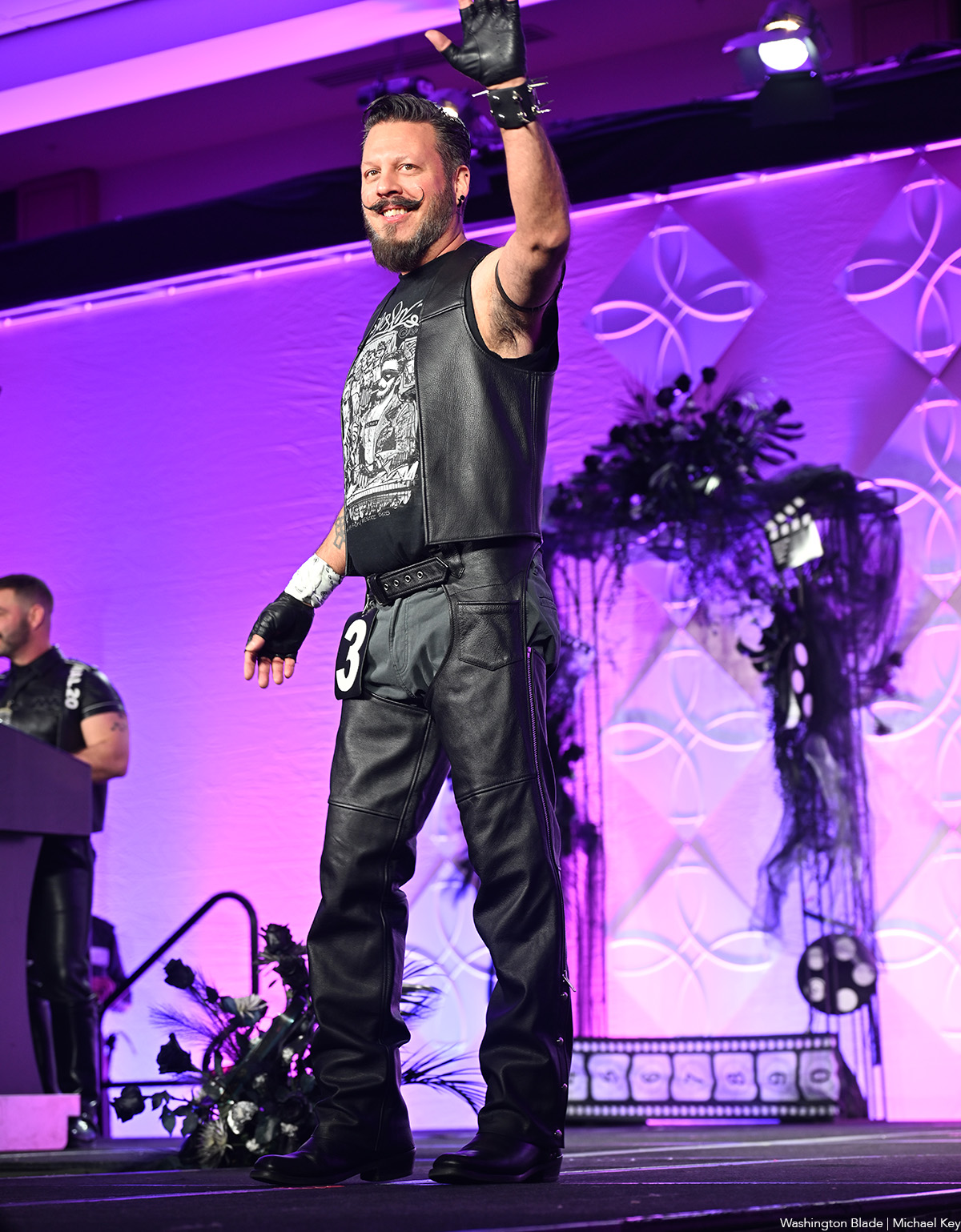
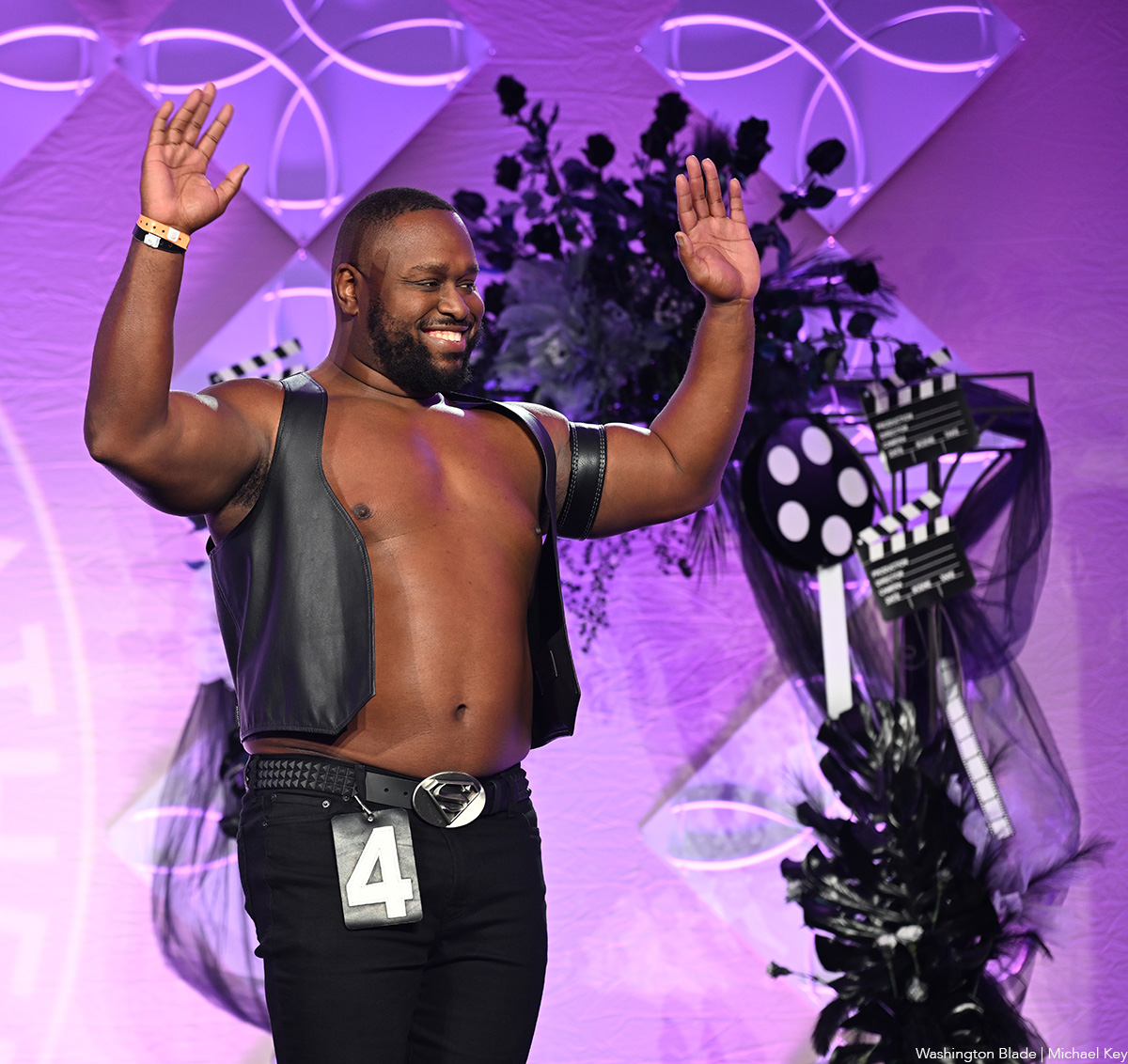
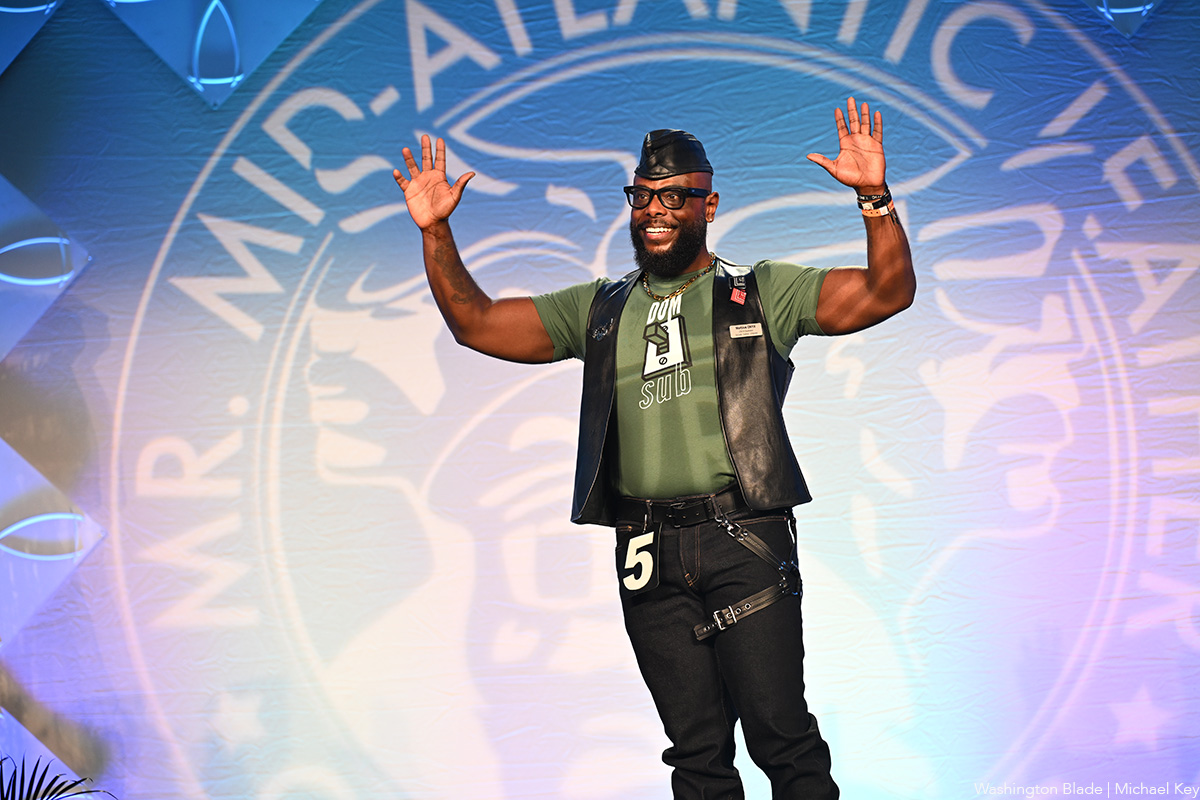
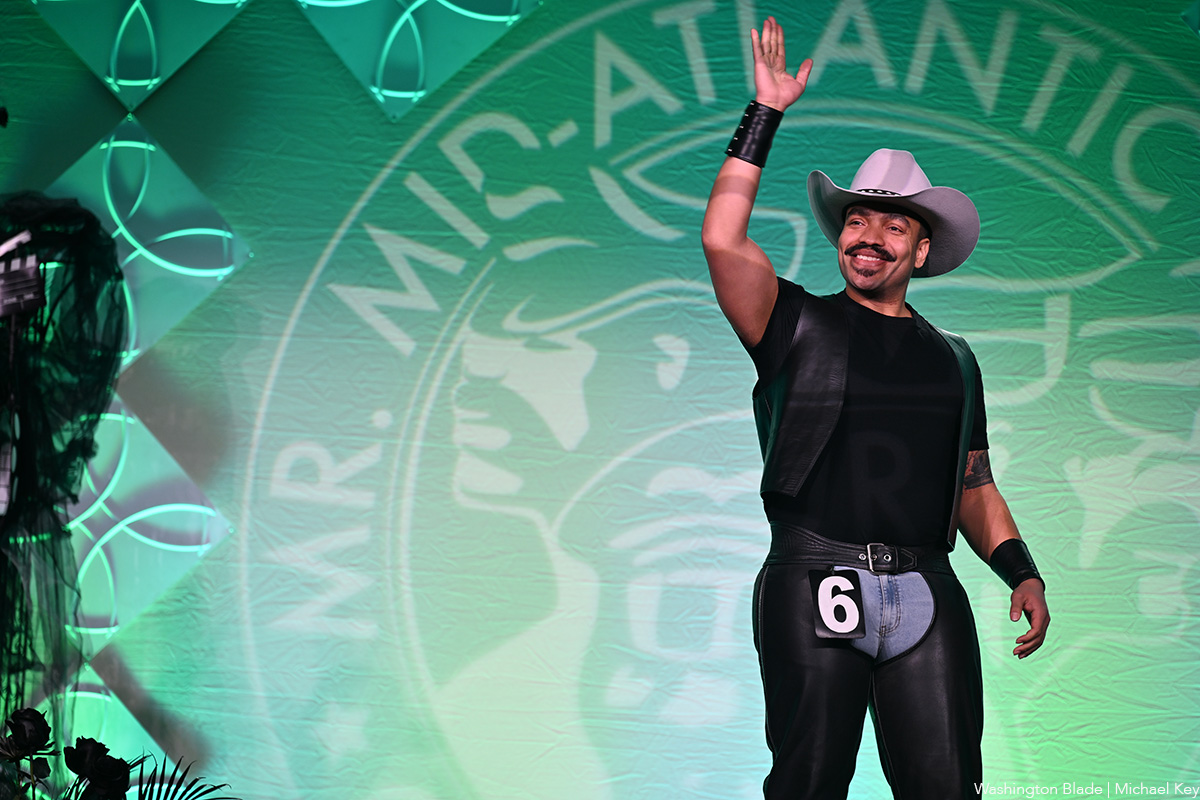
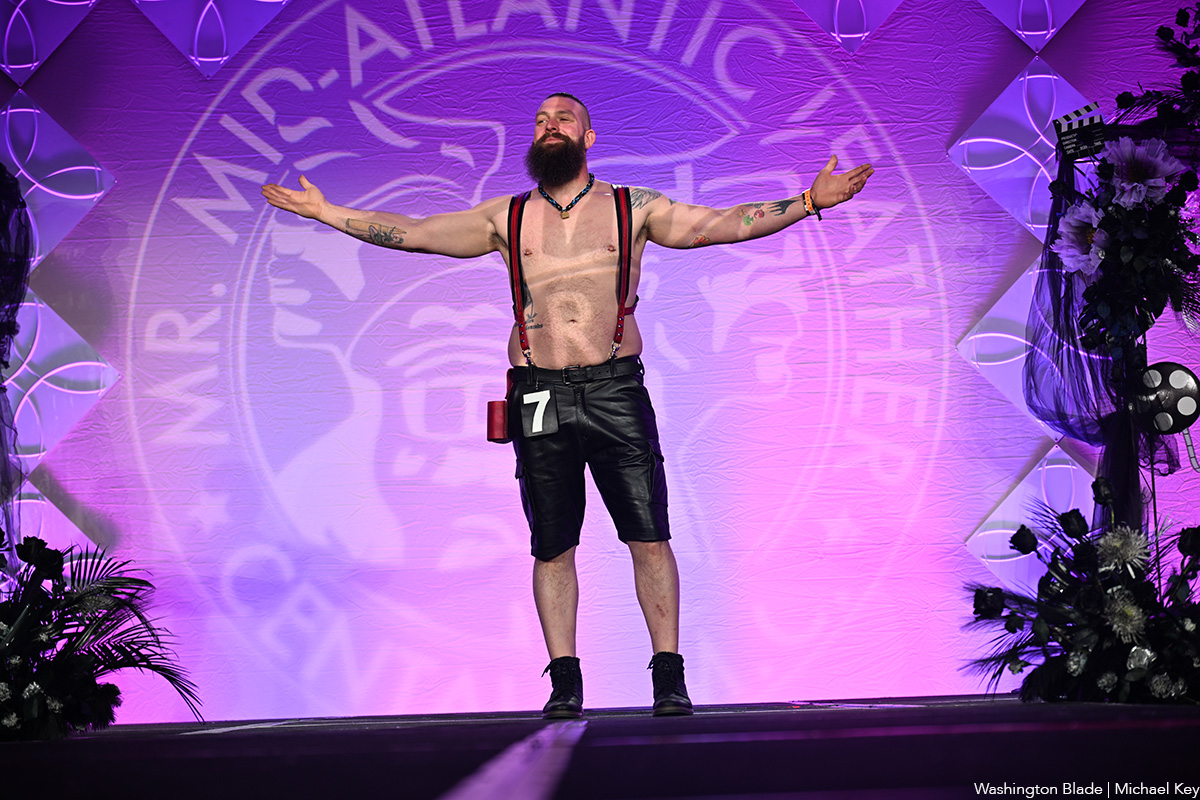
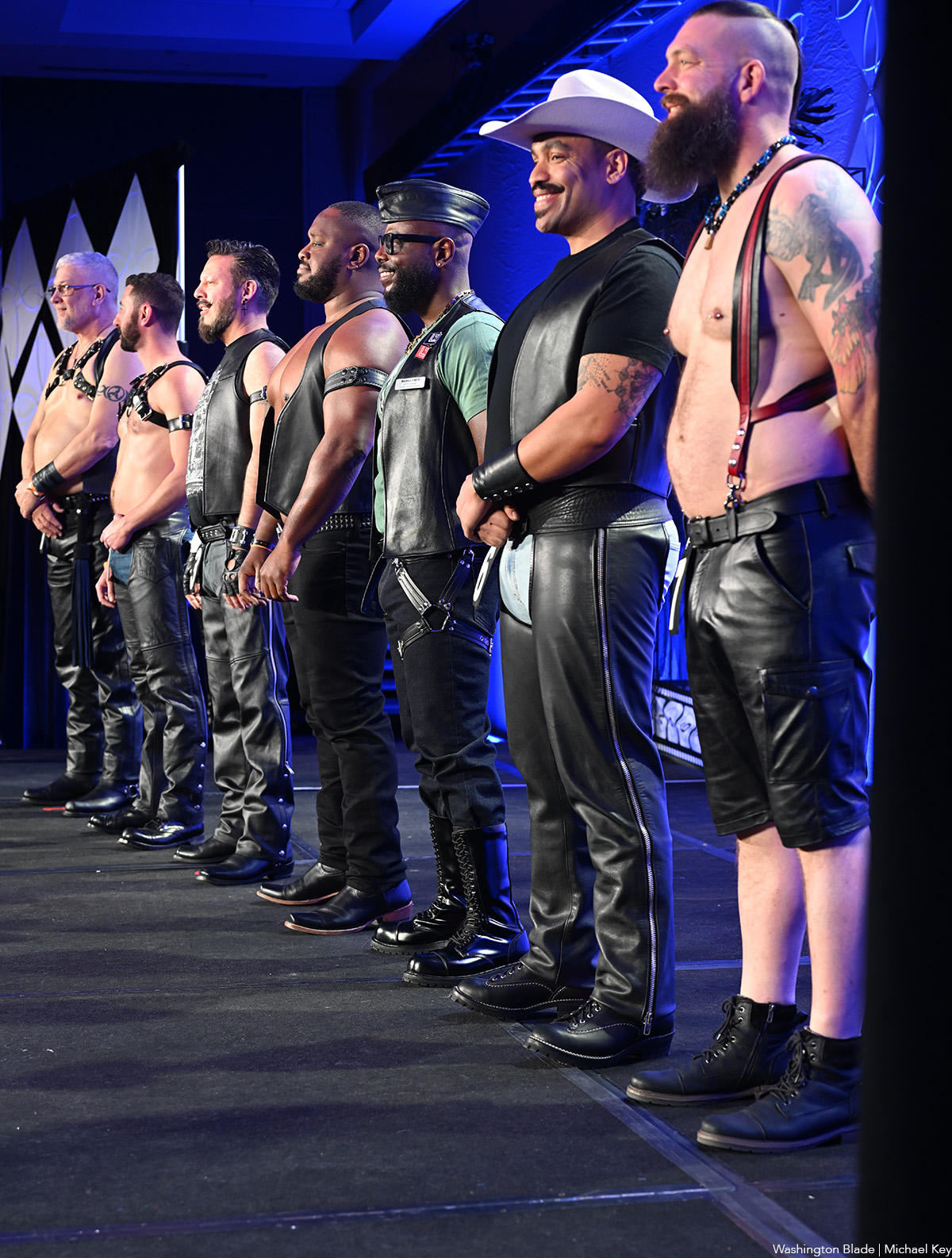
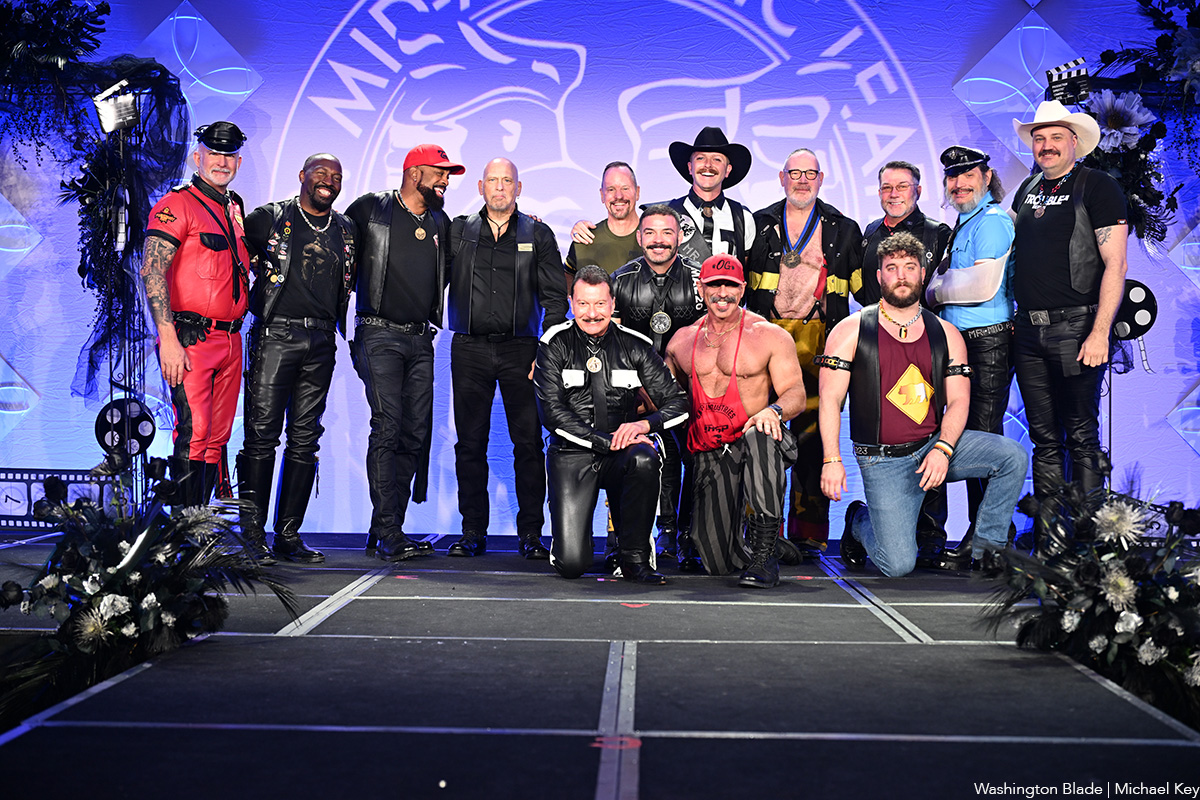
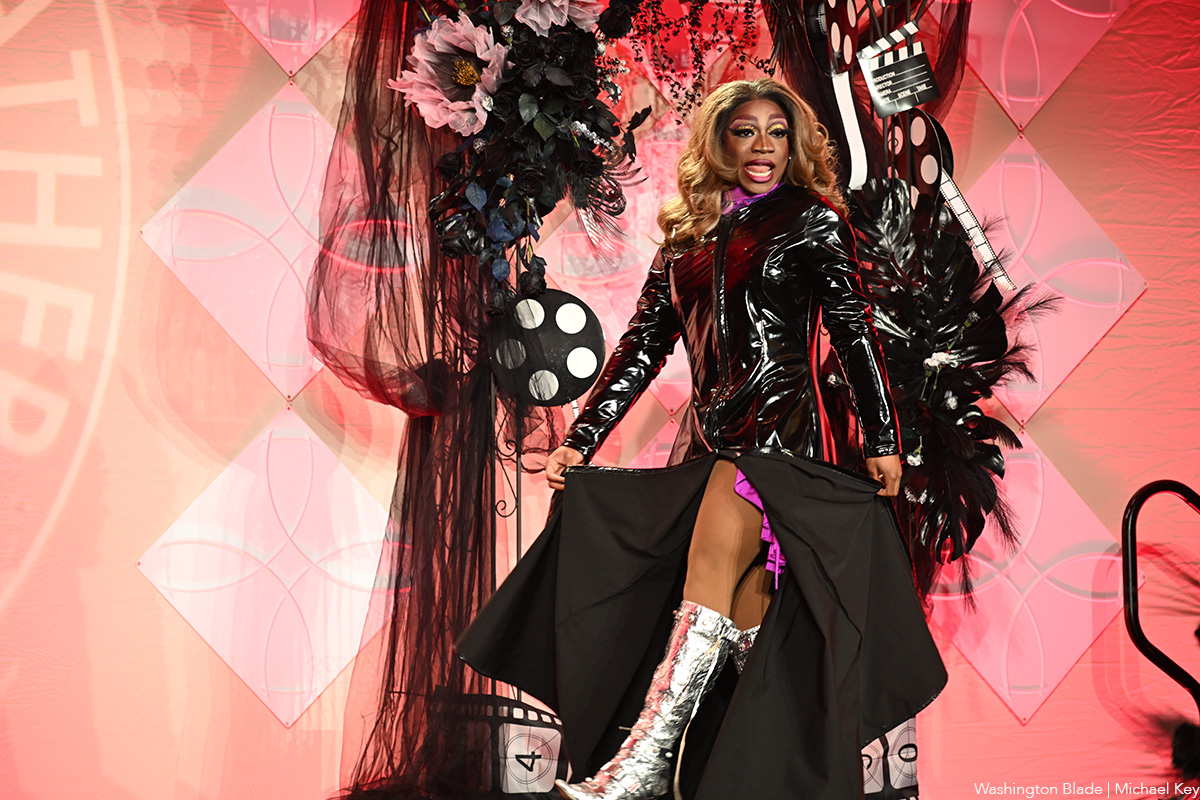
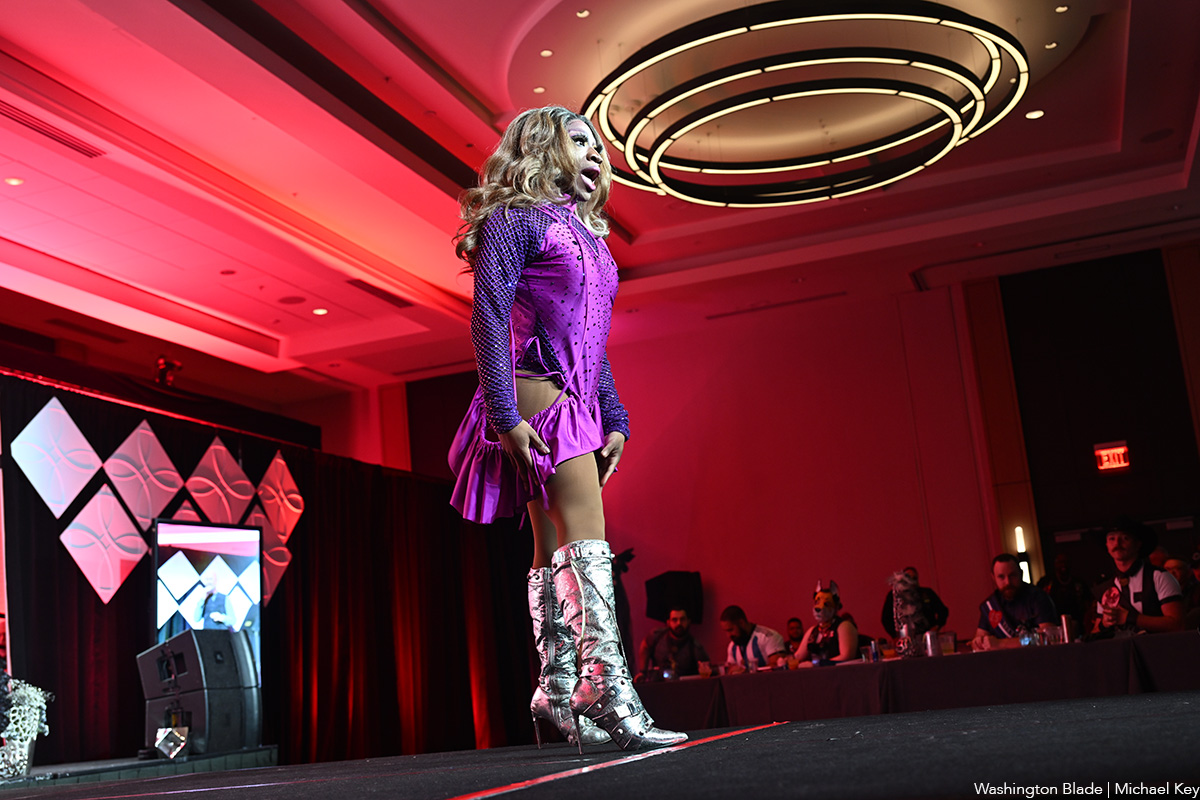
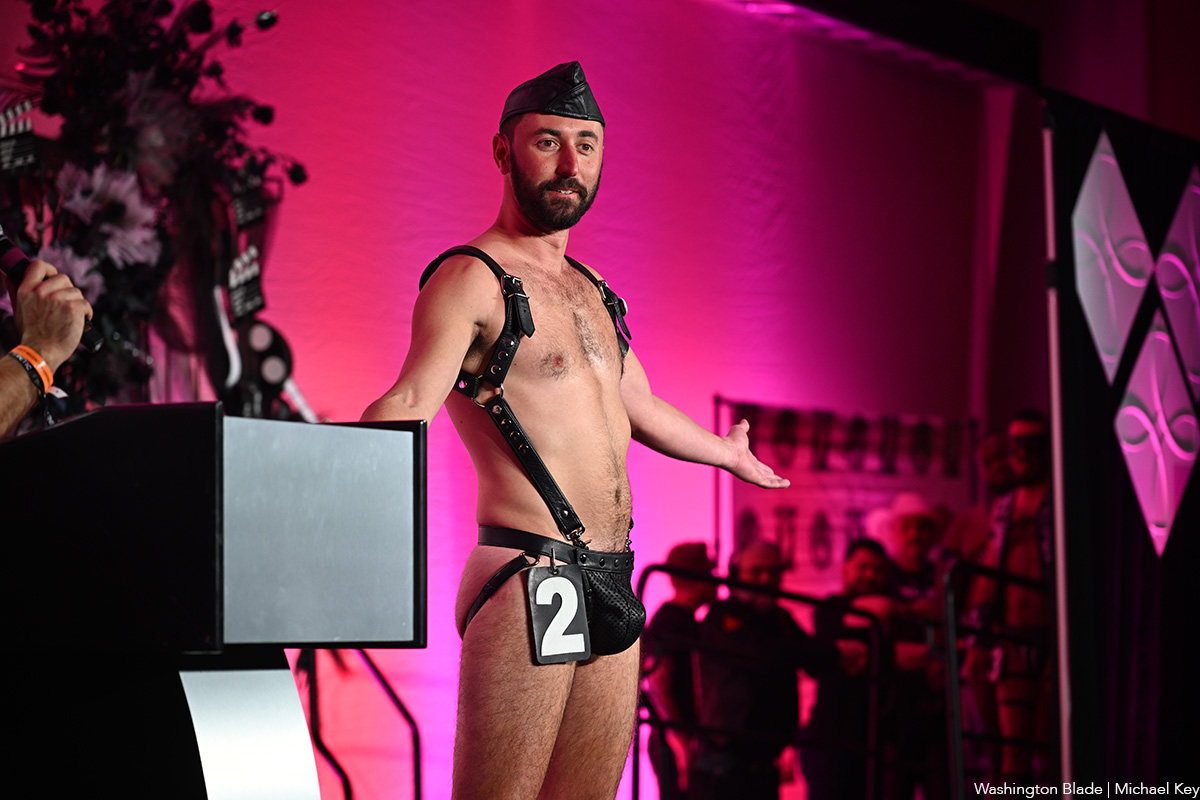
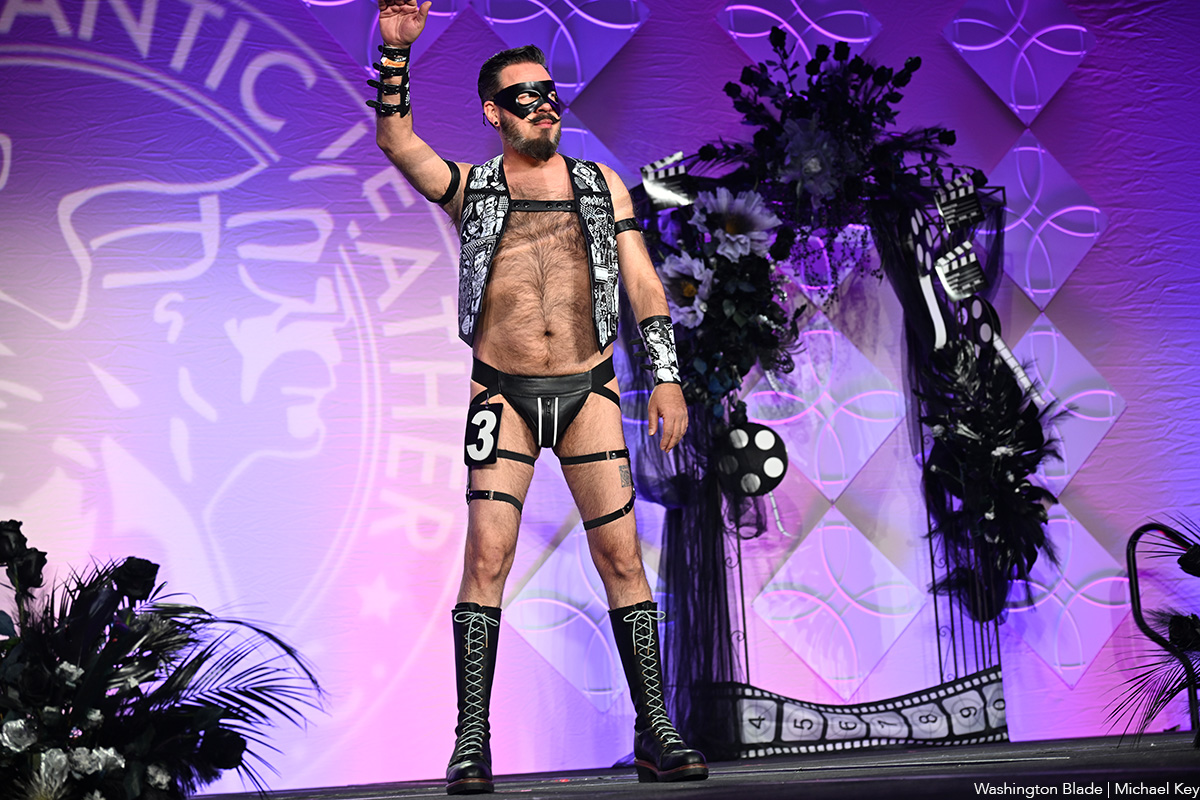
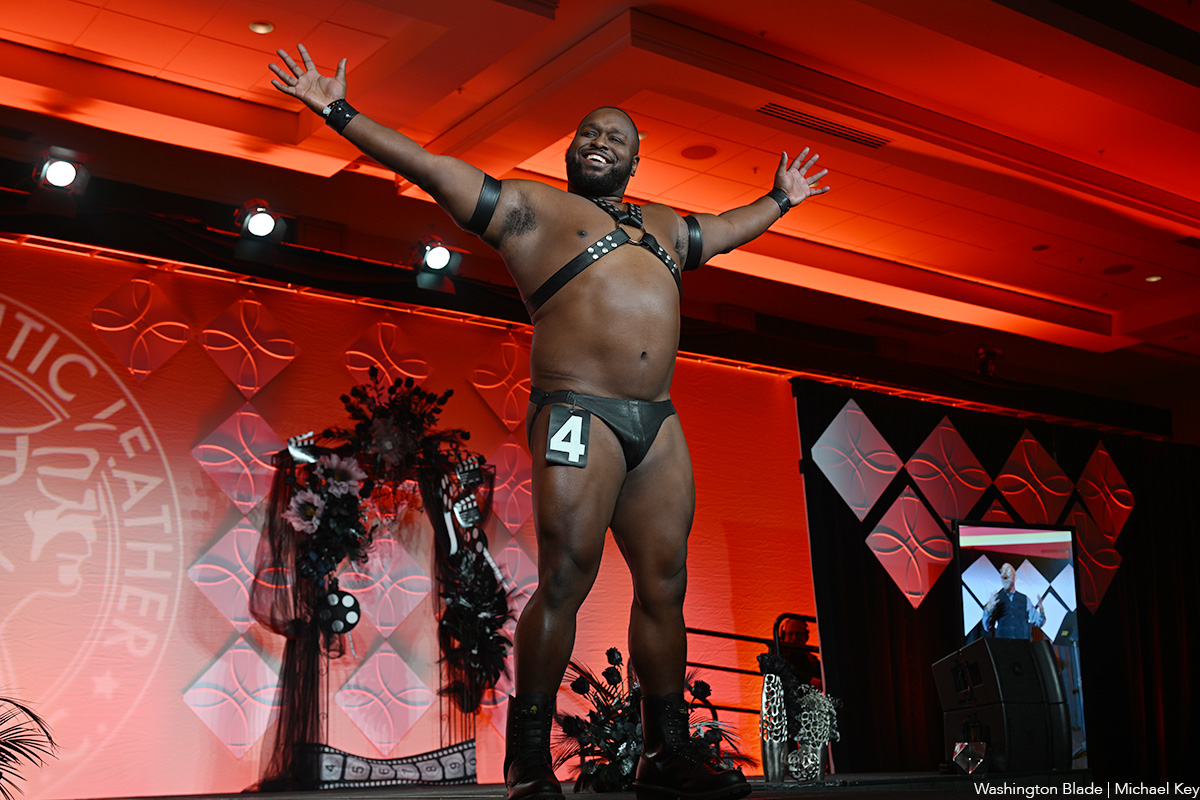
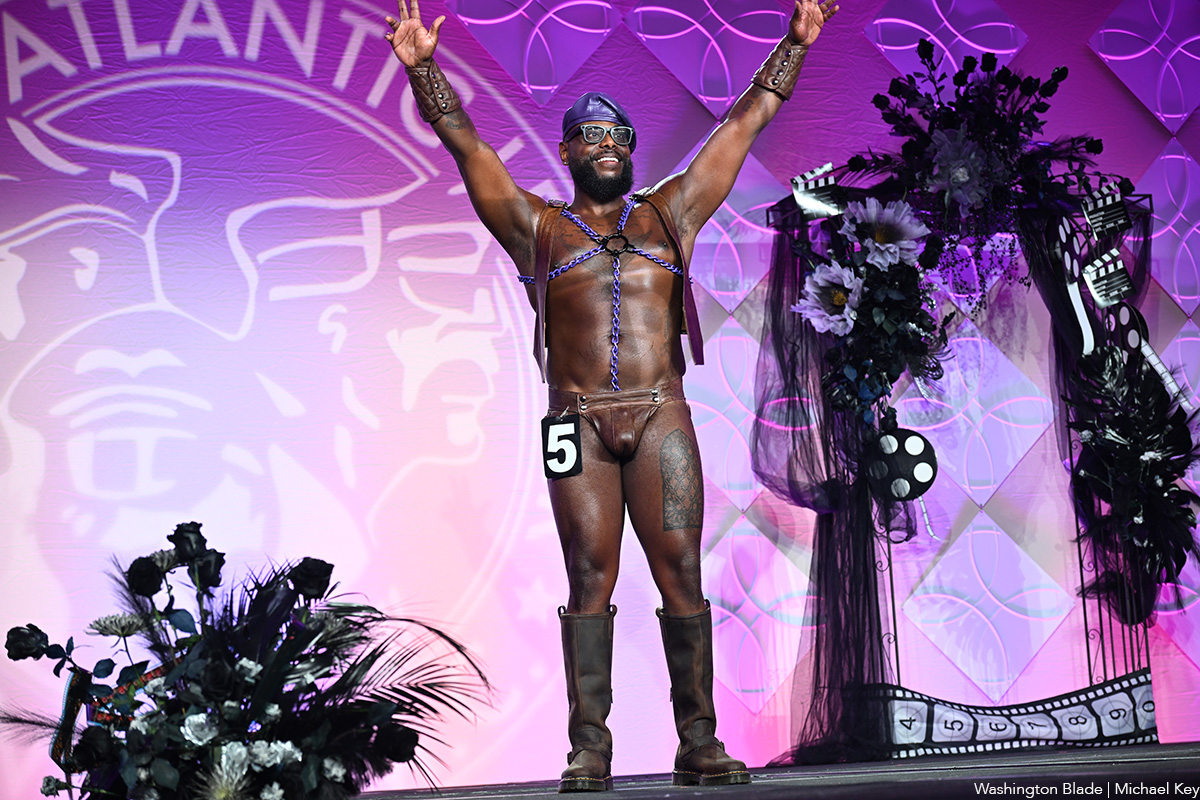
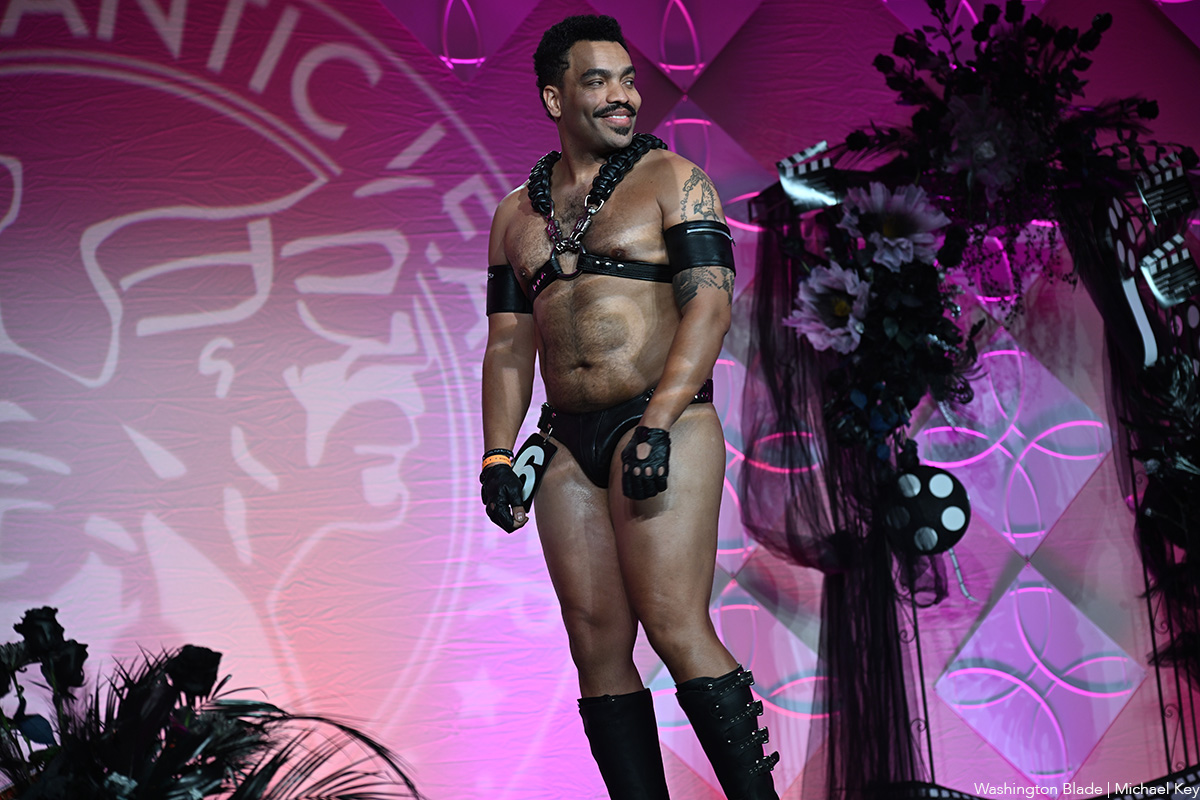
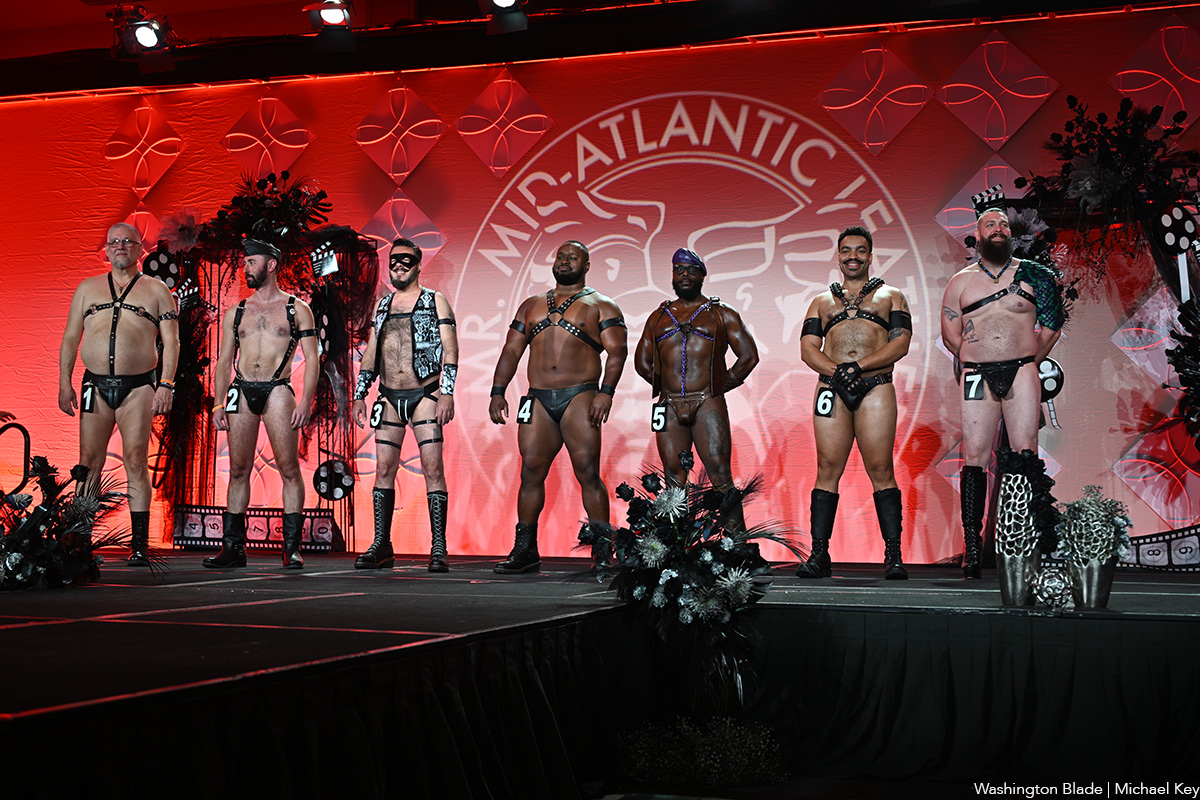
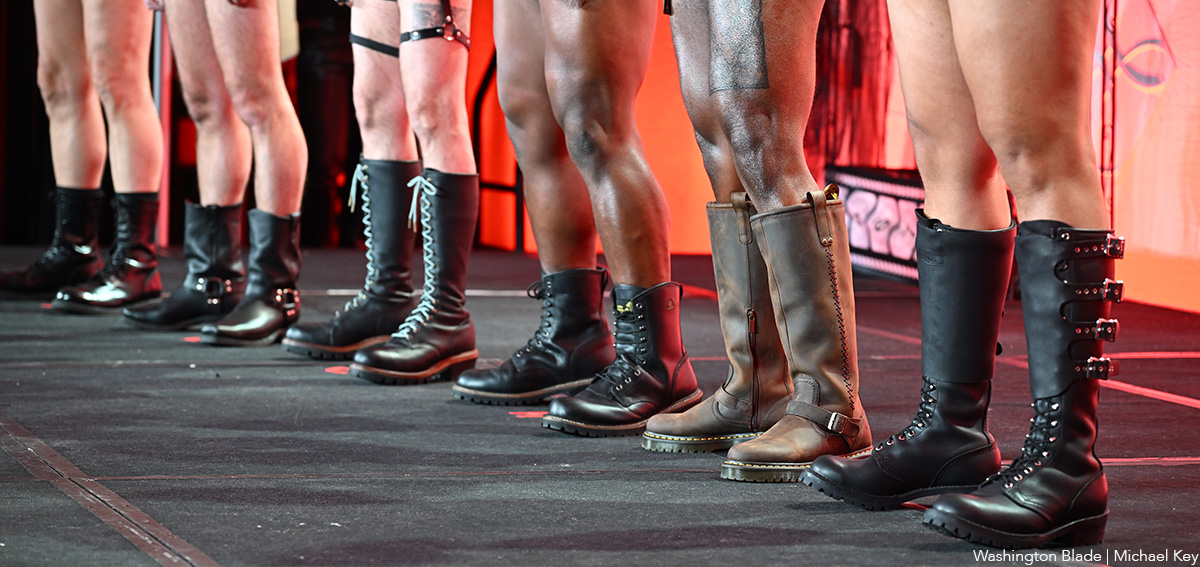
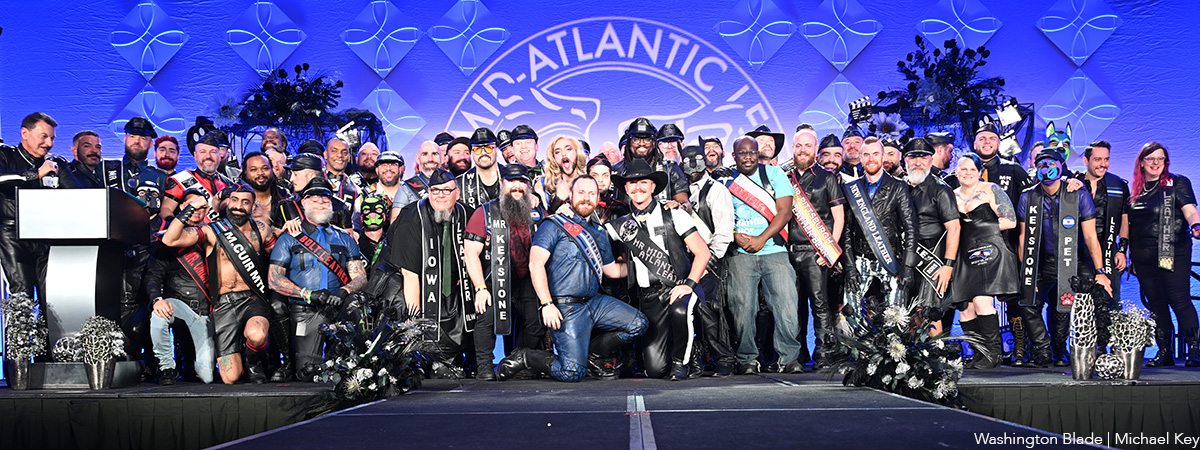
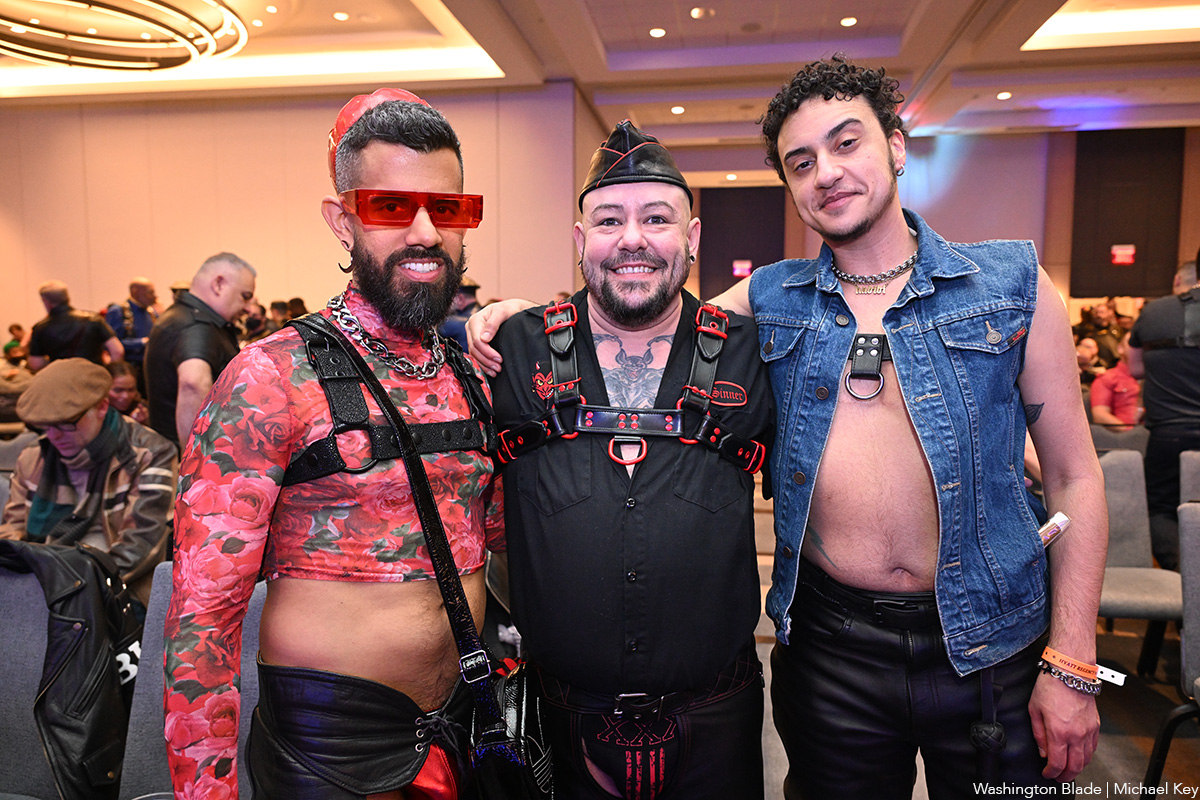
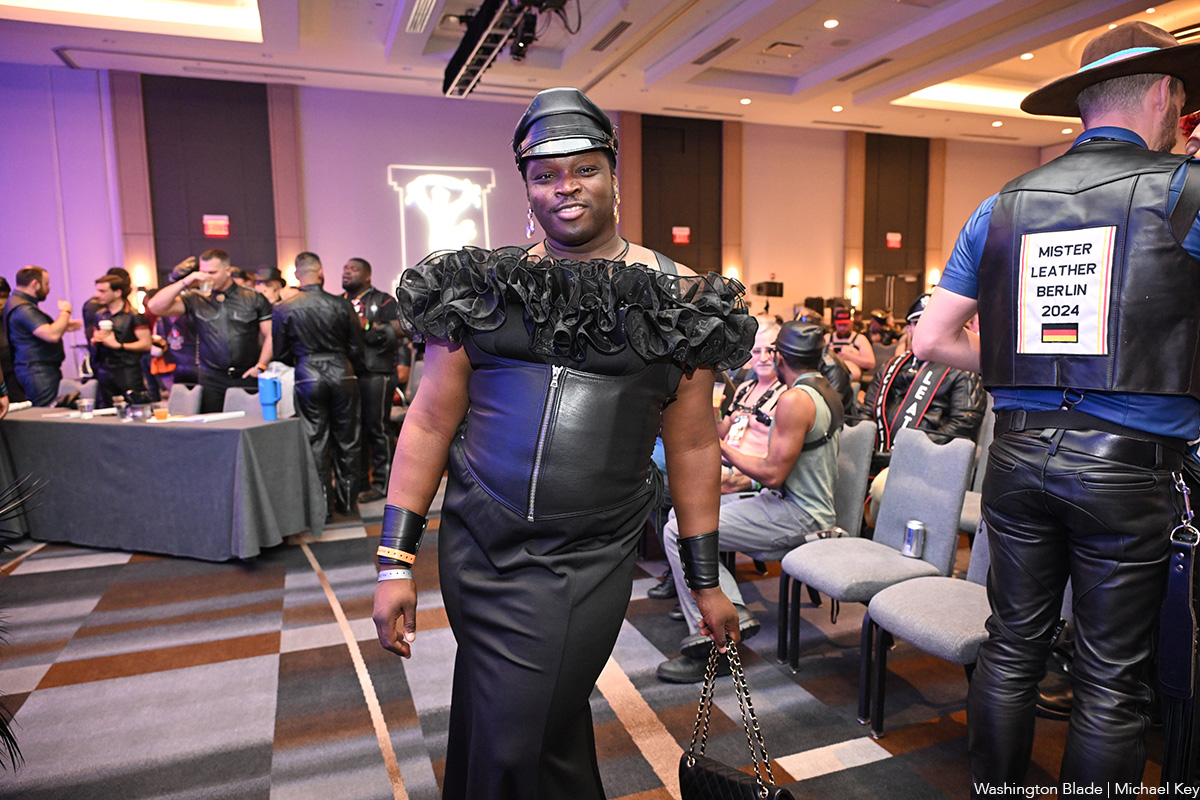
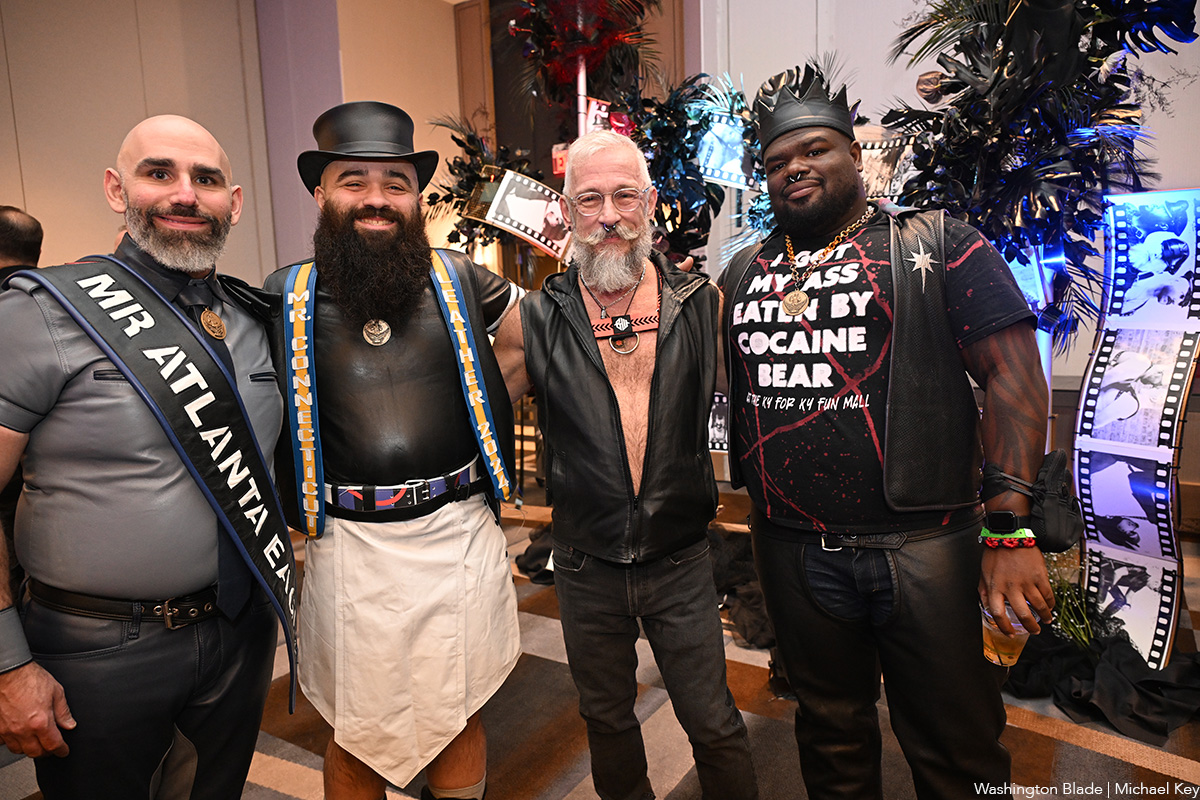
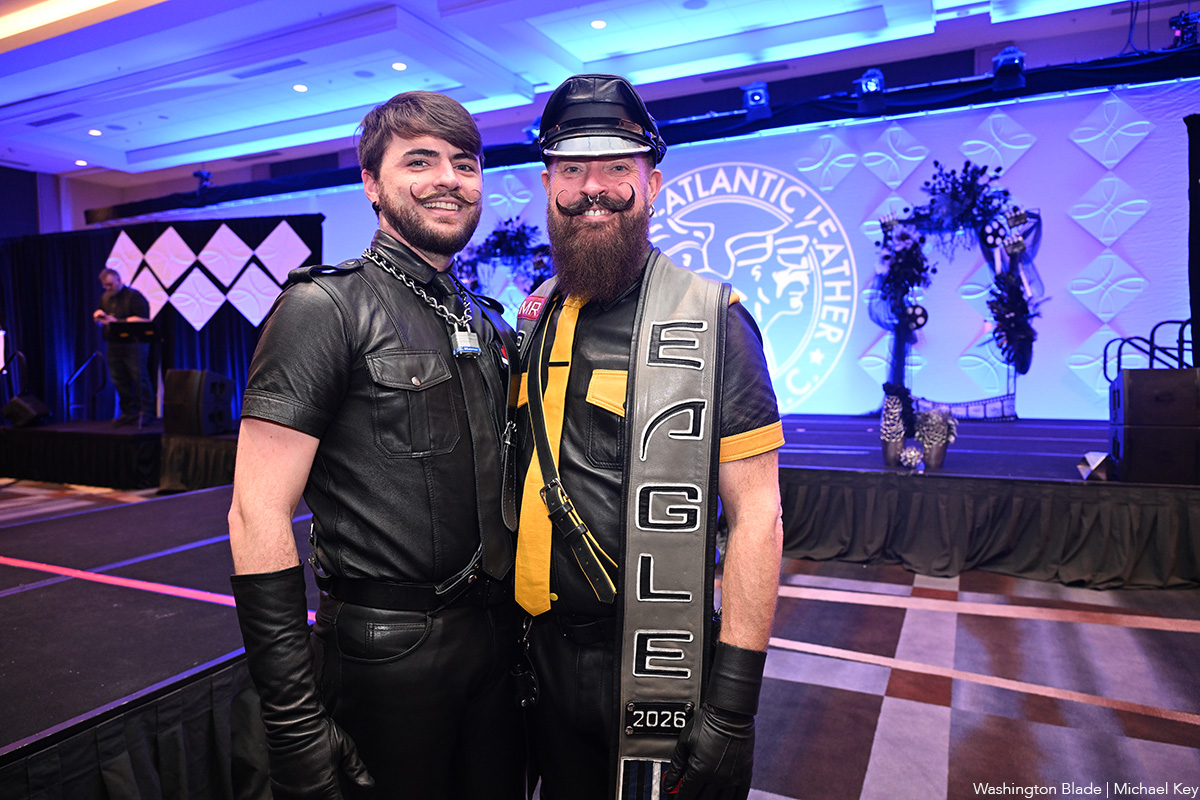
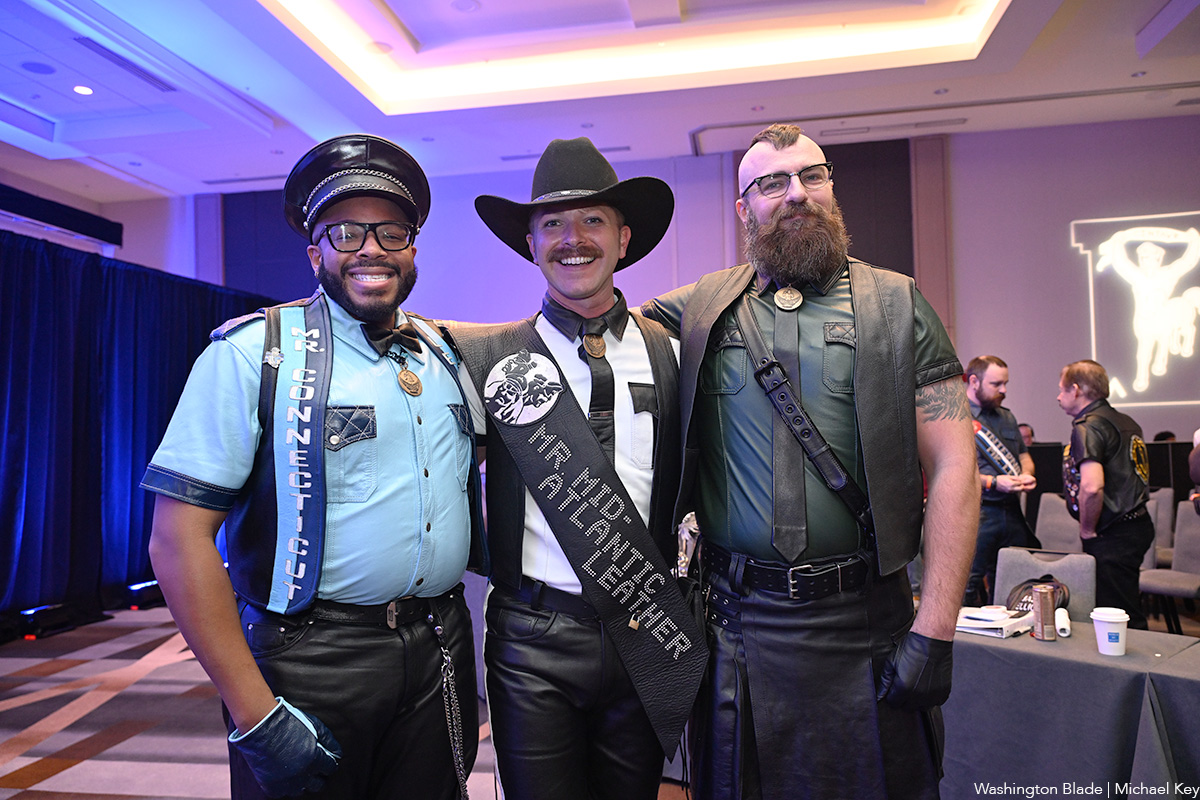
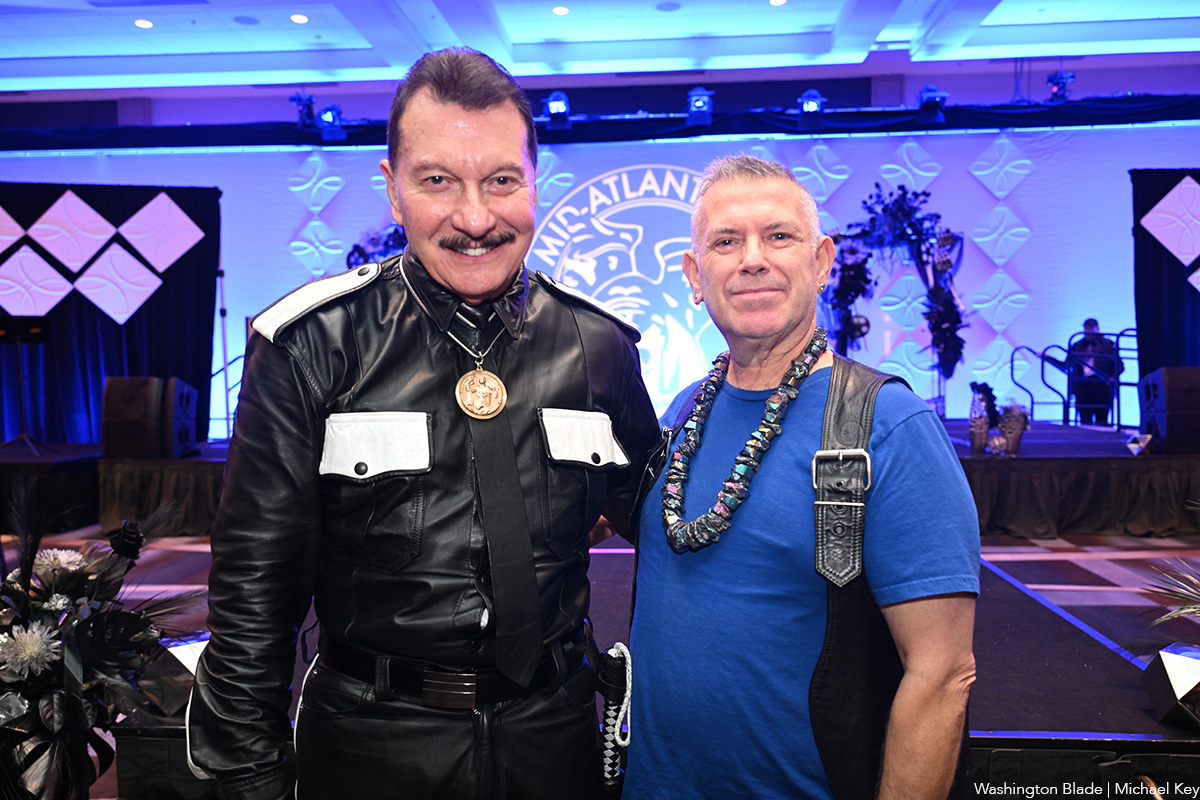
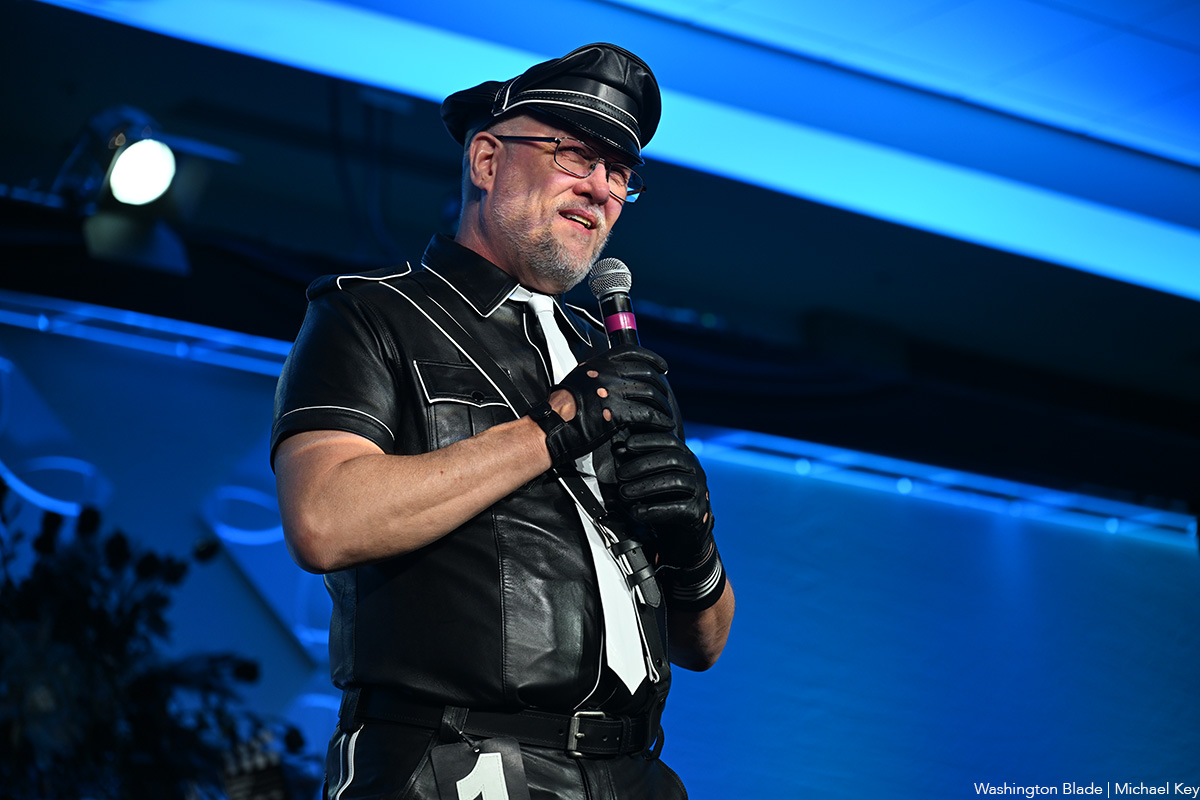
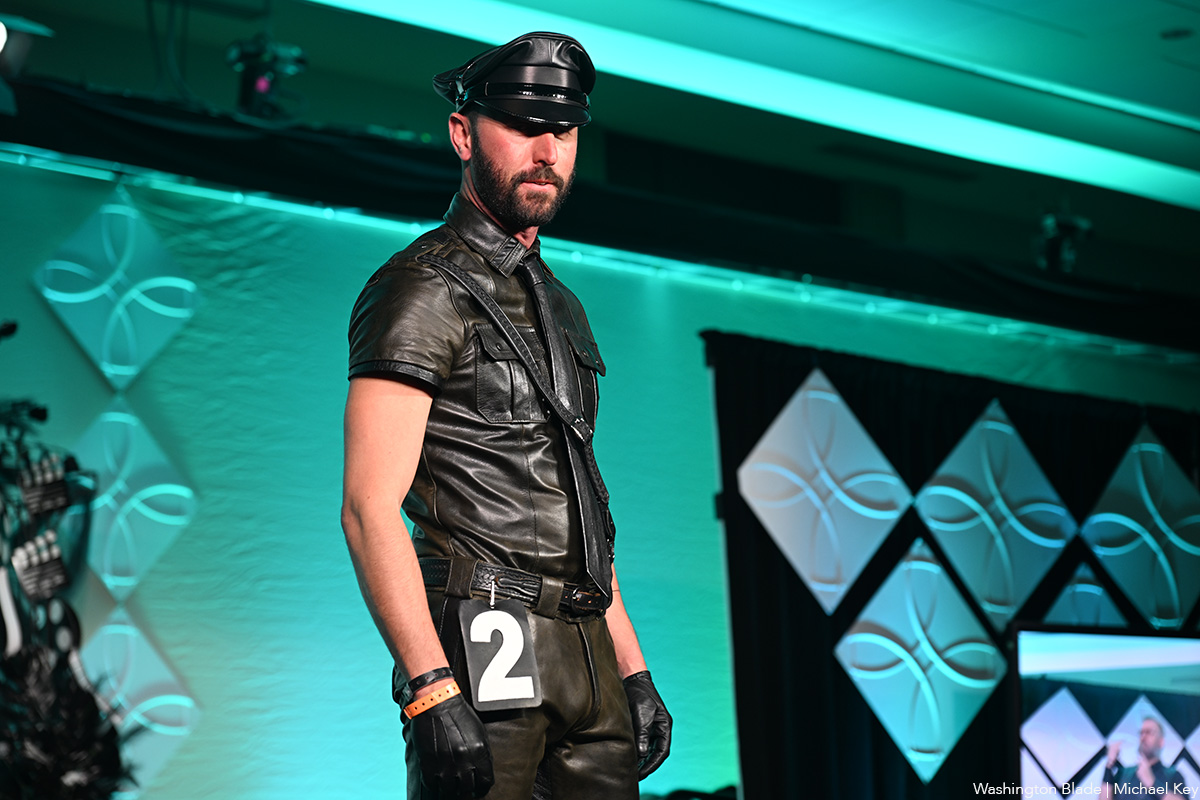
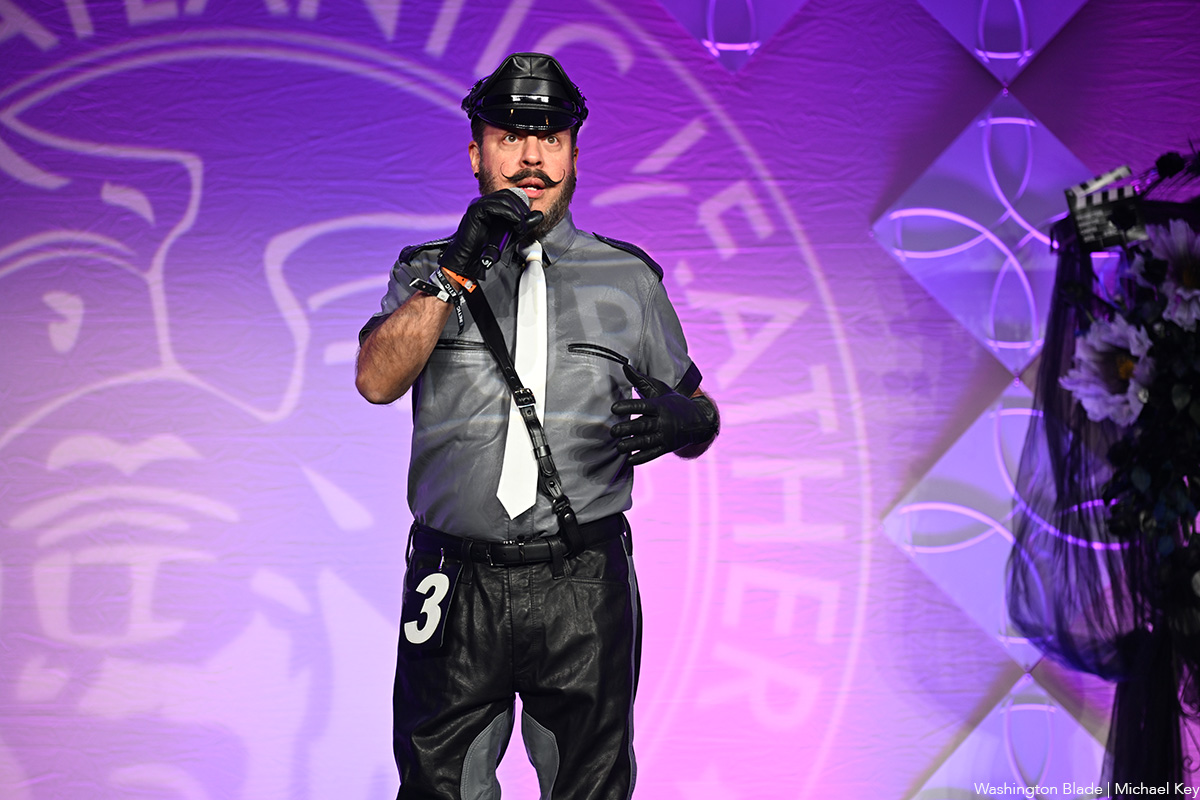
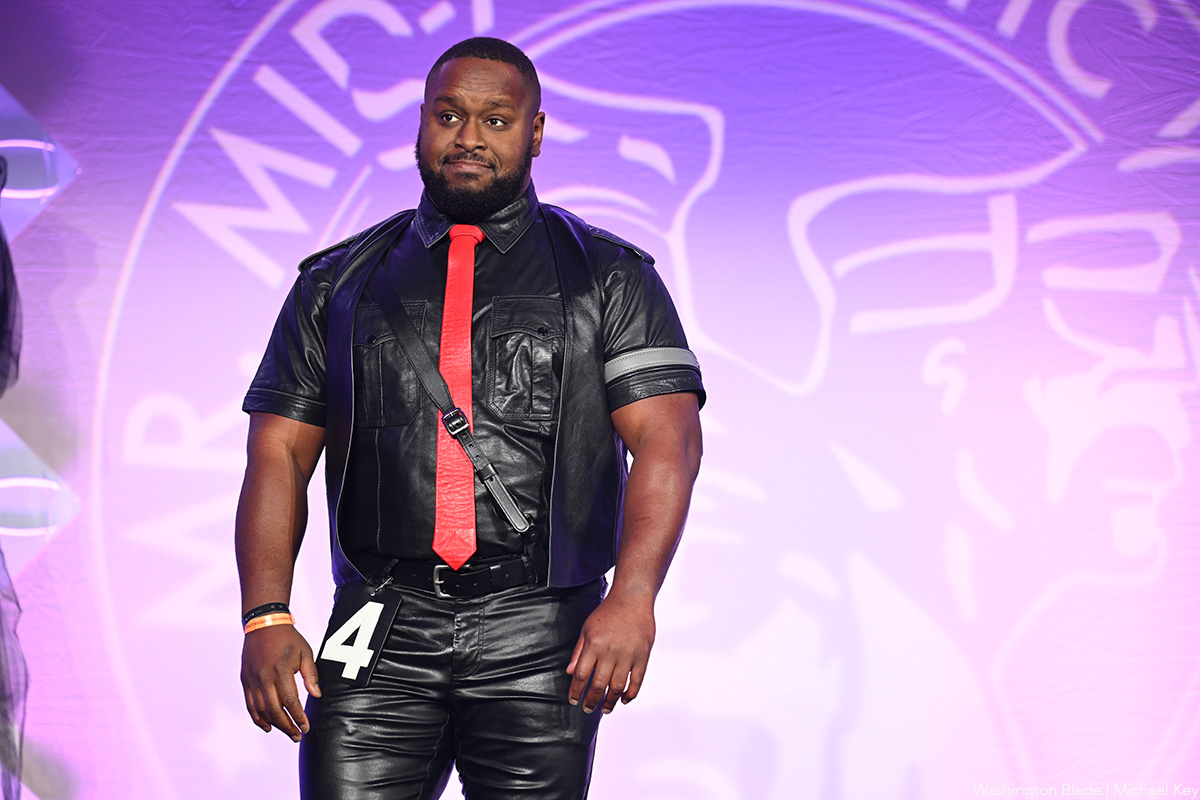
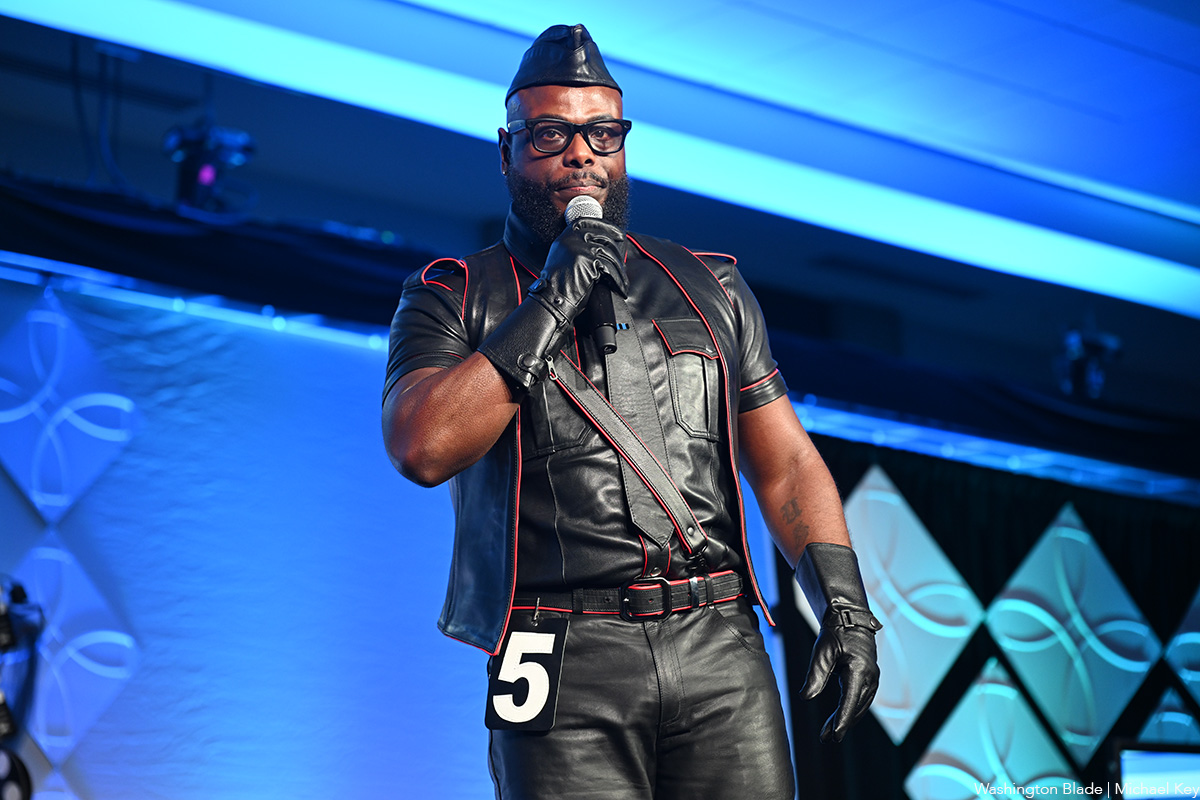
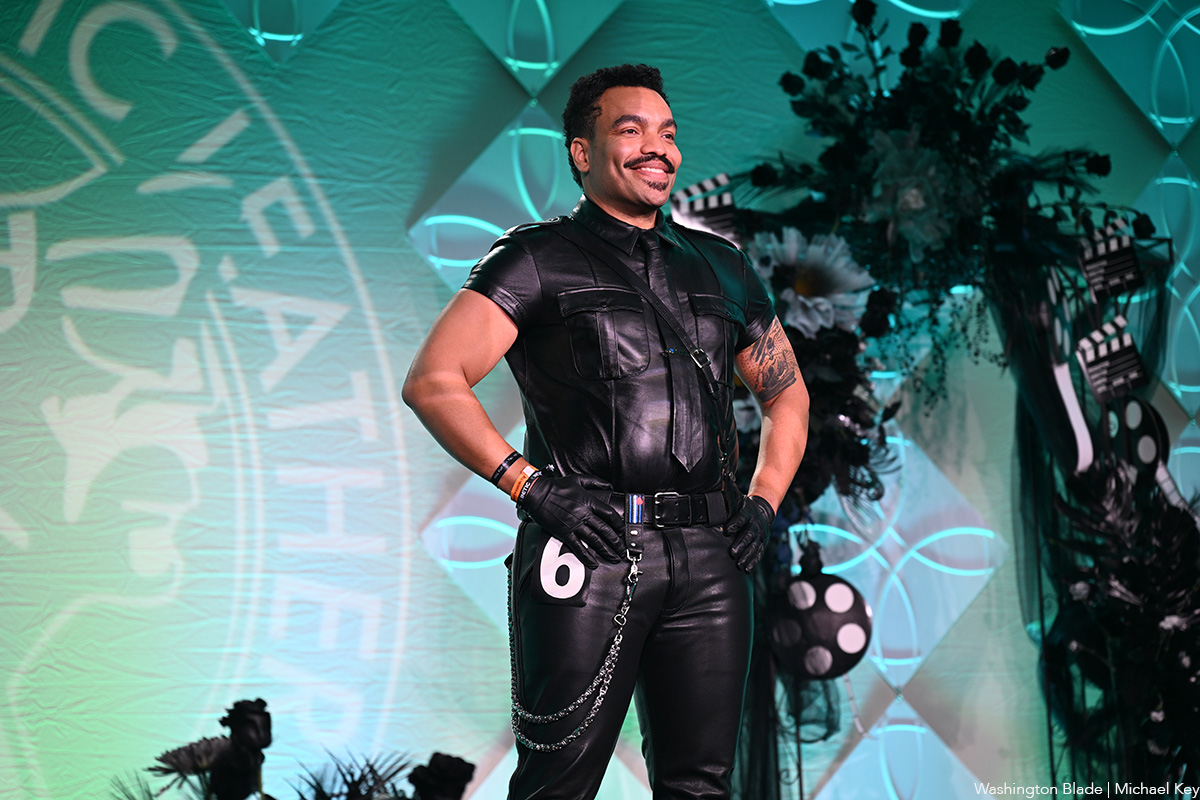
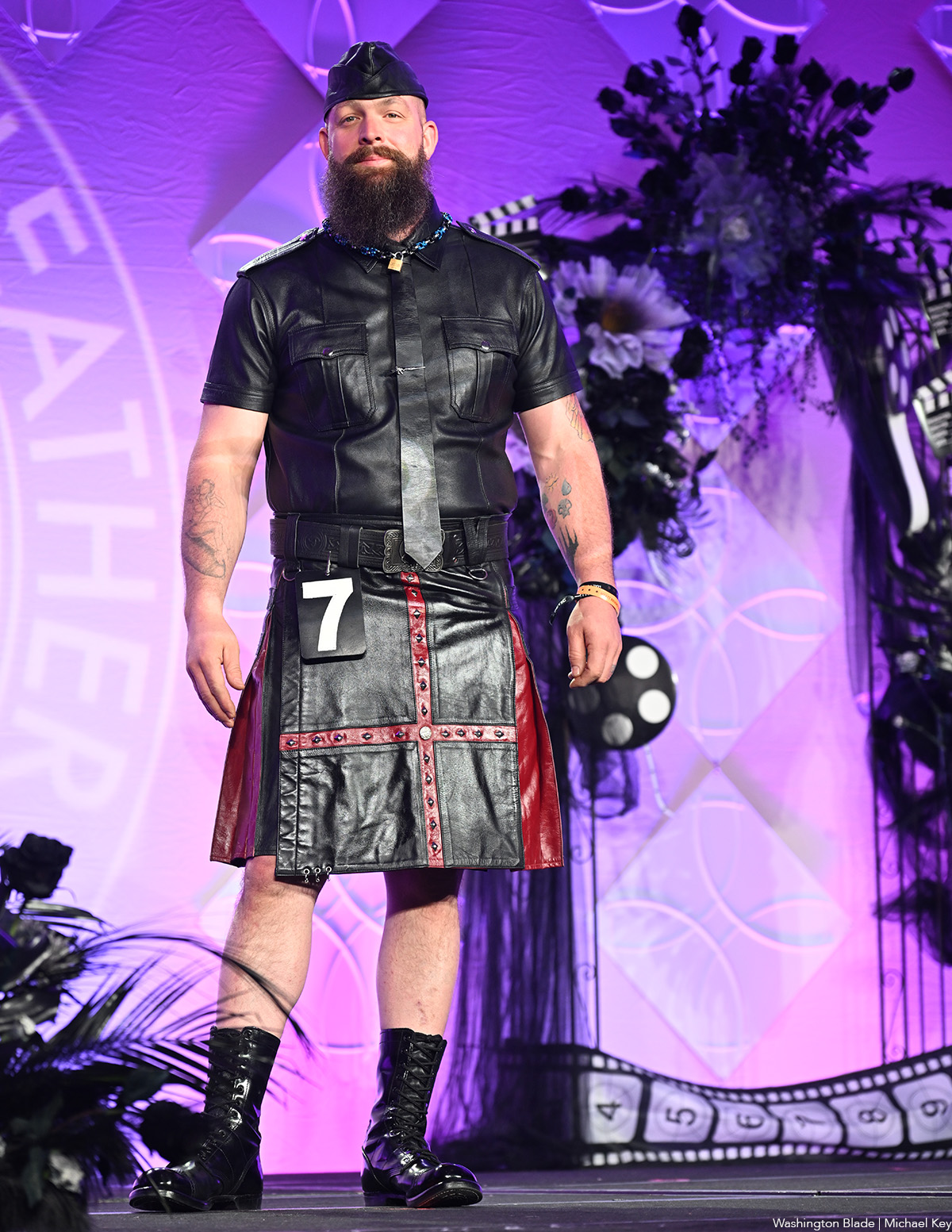
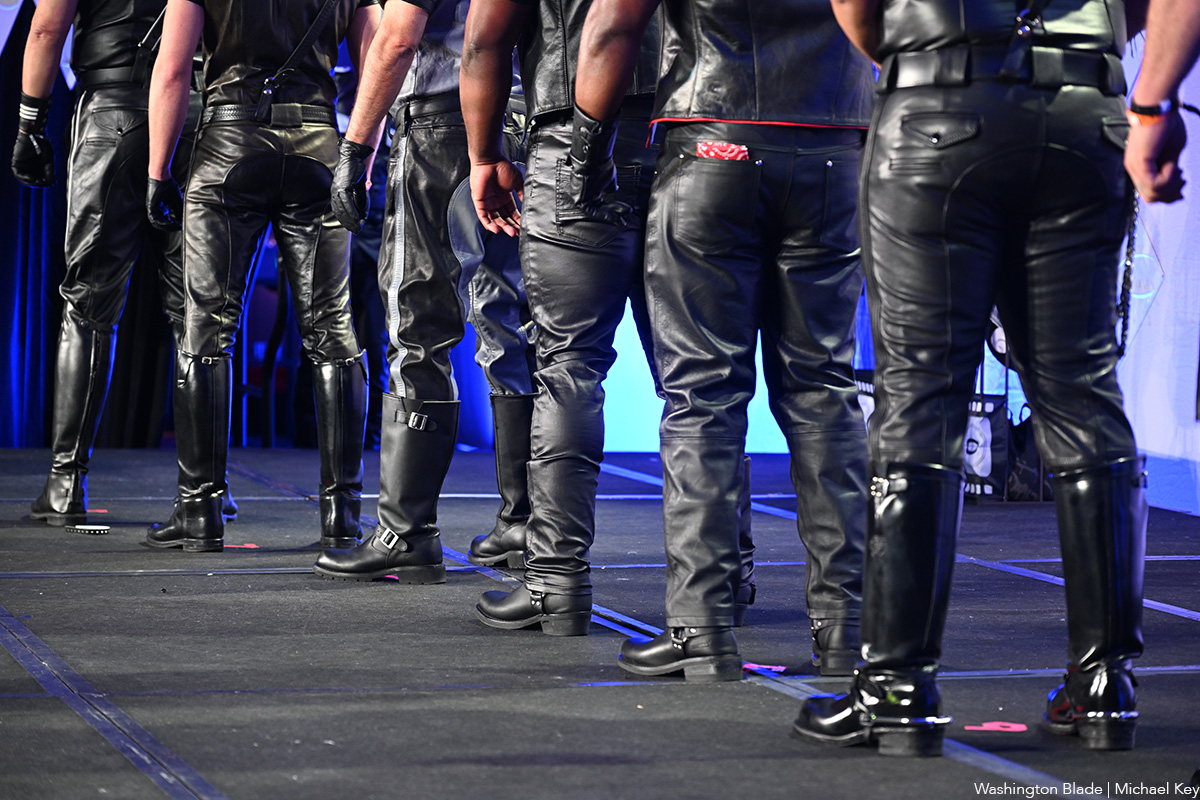
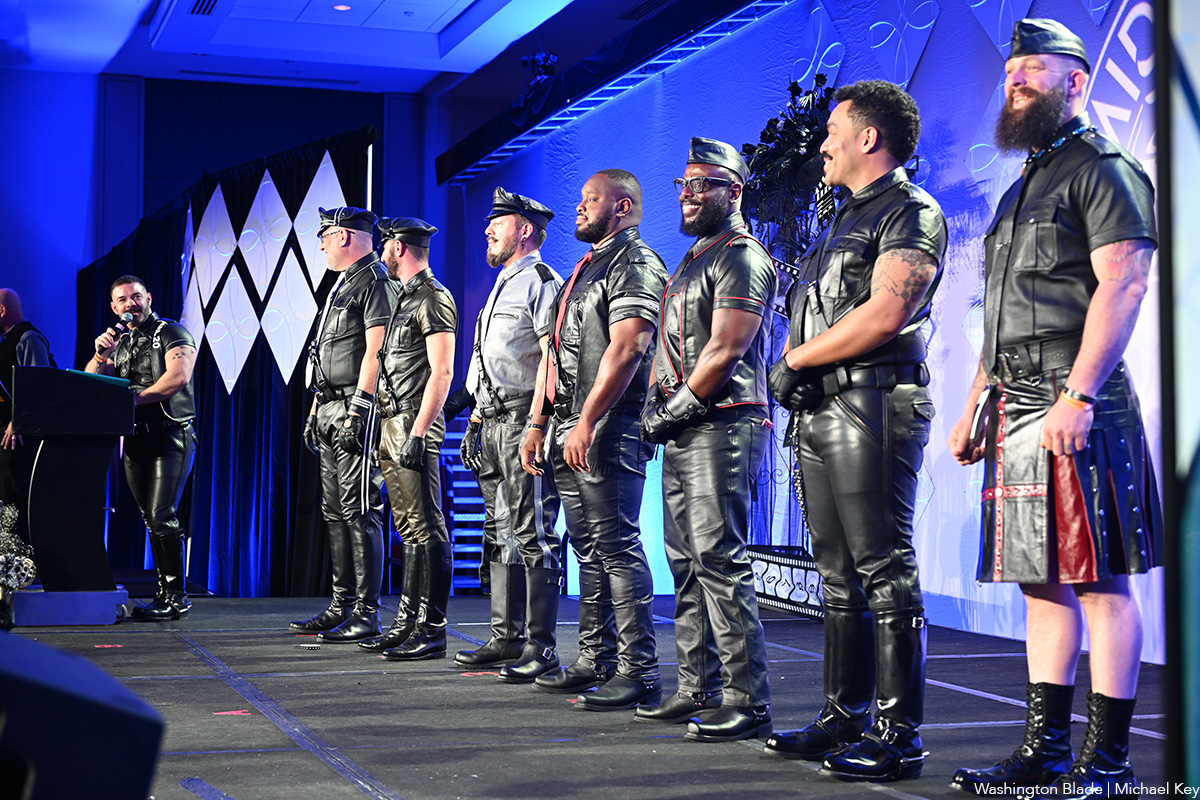
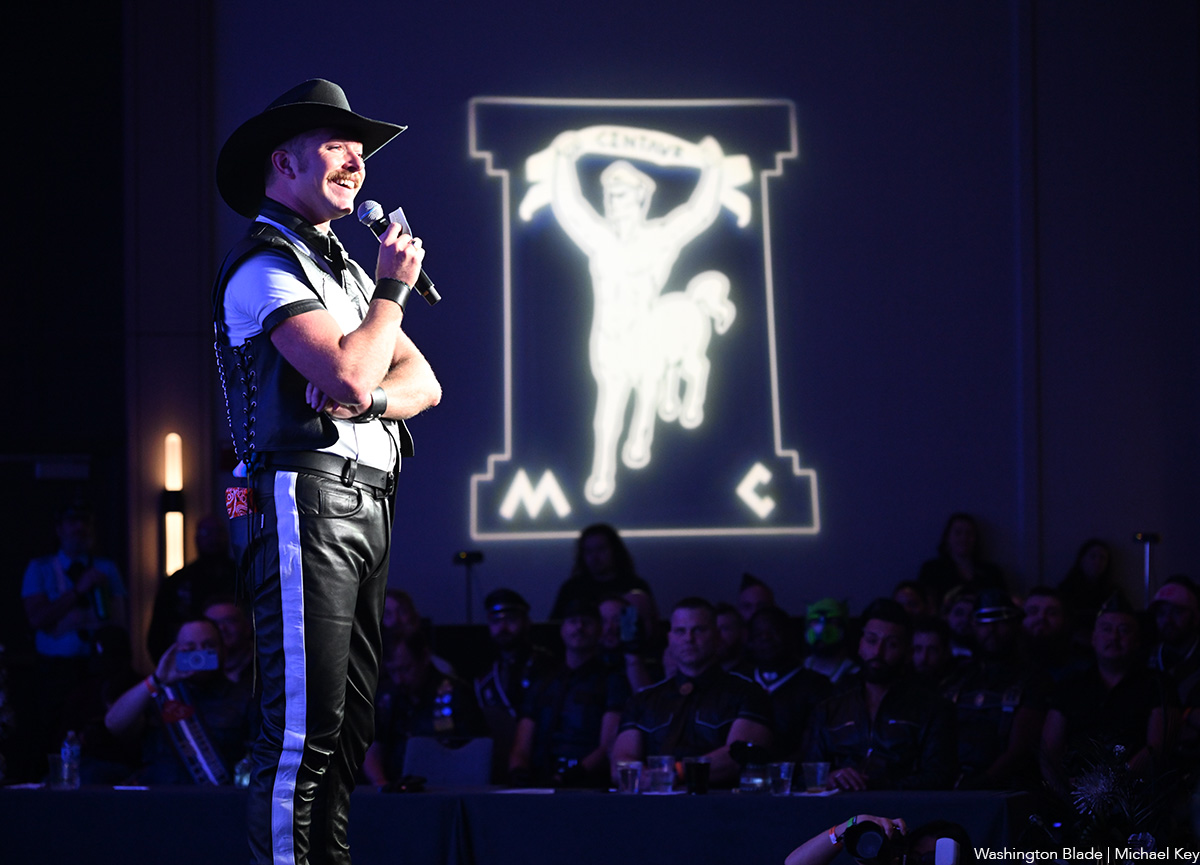
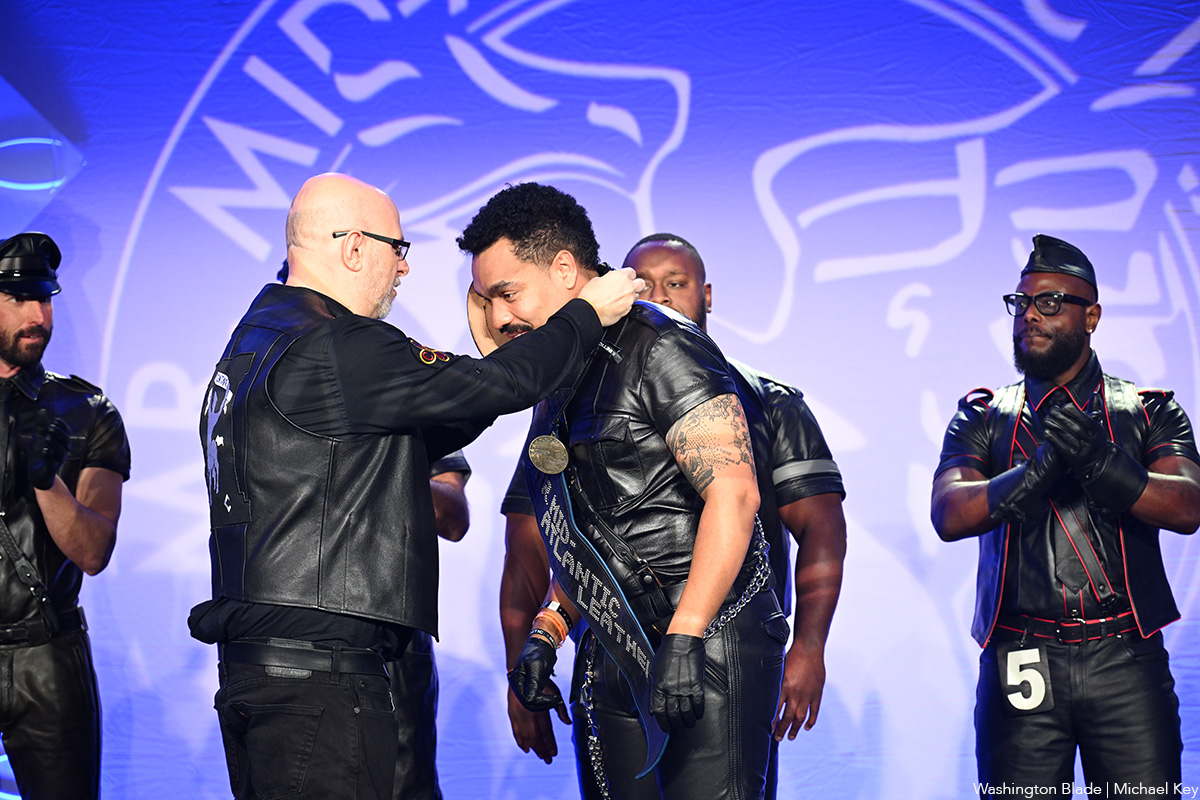
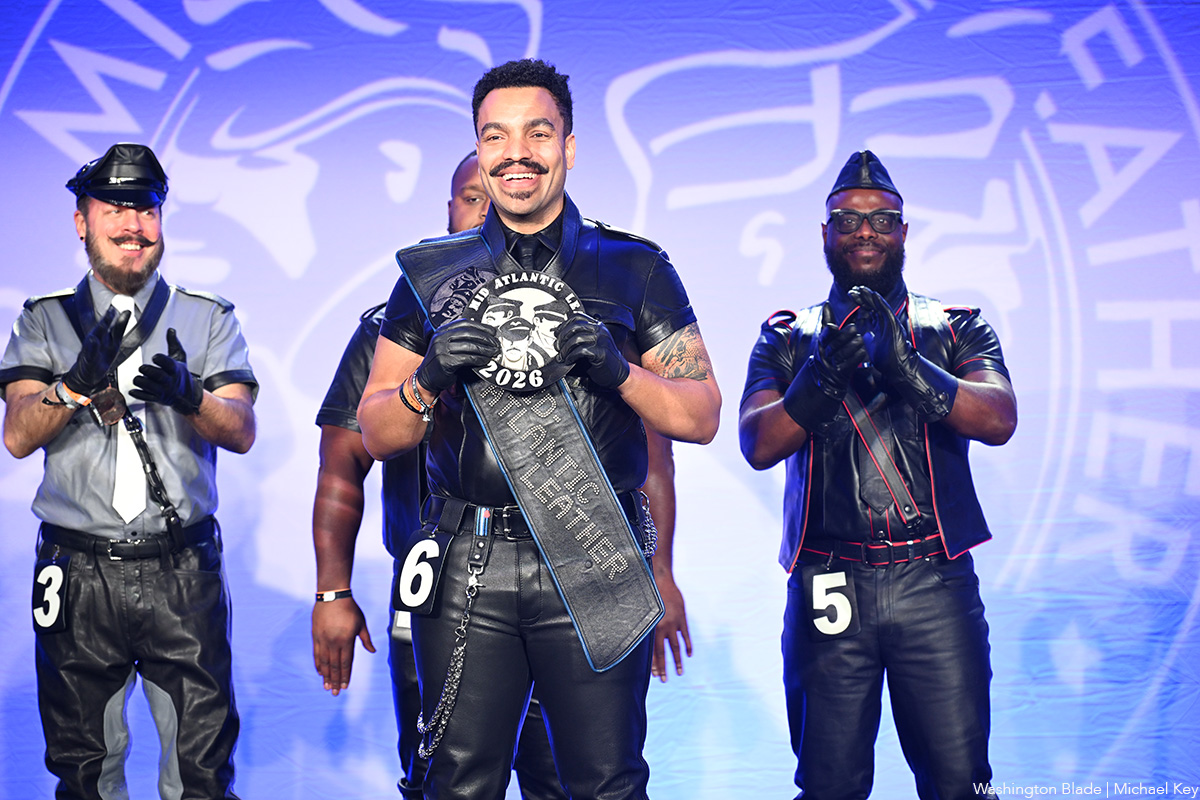
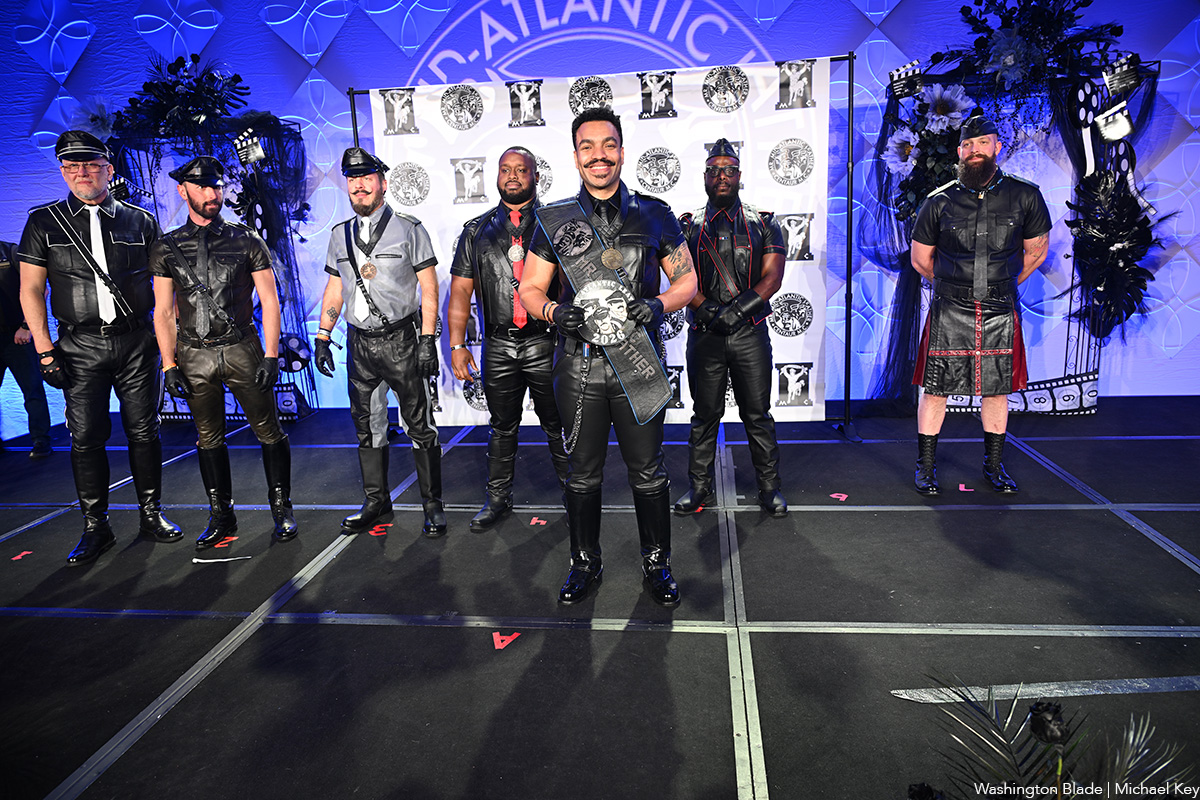
Theater
Voiceless ‘Antony & Cleopatra’ a spectacle of operatic proportions
Synetic production pulls audience into grips of doomed lovers’ passion
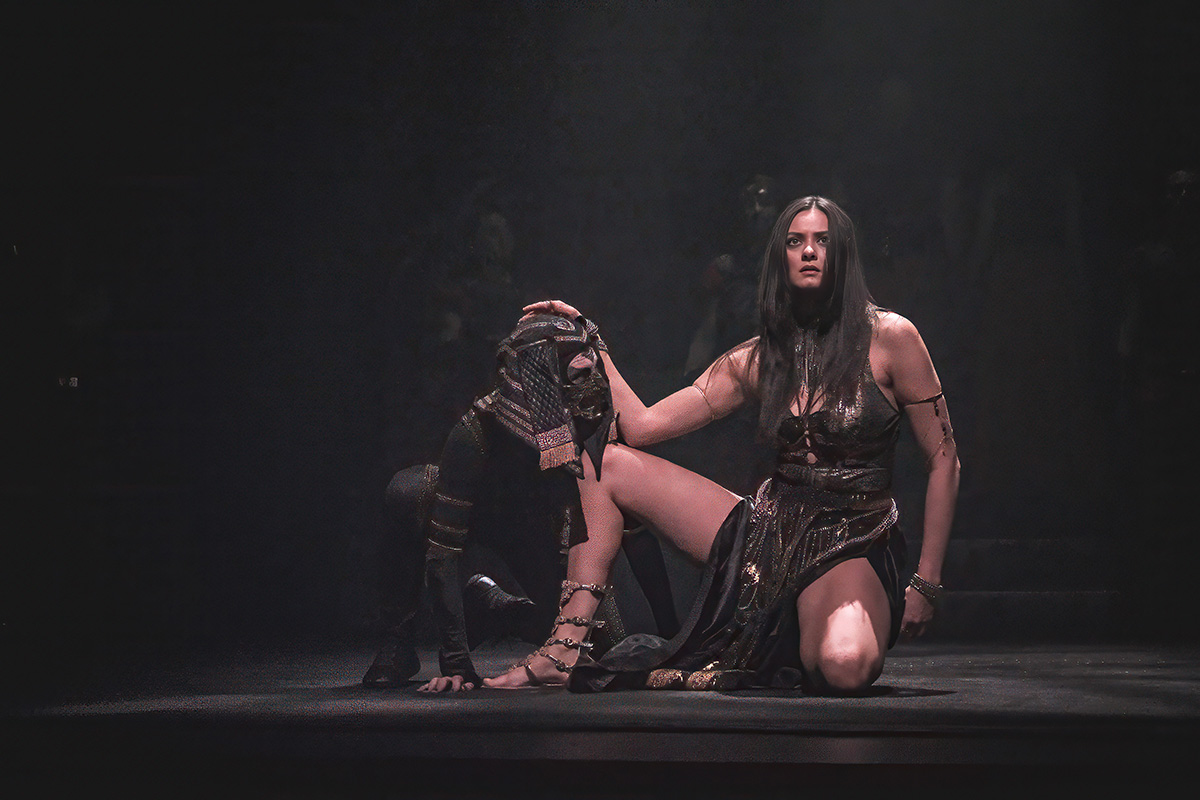
‘Antony & Cleopatra’
Through Jan. 25
Synetic Theater at
Shakespeare Theatre Company’s Klein Theatre
450 7th St., N.W.
Synetictheater.org
A spectacle of operatic proportions, Synetic Theater’s “Antony & Cleopatra” is performed entirely voiceless. An adaptation of the Bard’s original (a play bursting with wordplay, metaphors, and poetic language), the celebrated company’s production doesn’t flinch before the challenge.
Staged by Paata Tsikurishvili and choreographed by Irina Tsikurishvili, this worthy remount is currently playing at Shakespeare Theatre Company’s Klein Theatre, the same venue where it premiered 10 years ago. Much is changed, including players, but the usual inimitable Synectic energy and ingenuity remain intact.
As audiences file into the Klein, they’re met with a monumental pyramid bathed in mist on a dimly lit stage. As the lights rise, the struggle kicks off: Cleopatra (Irina Kavsadze) and brother Ptolemy (Natan-Maël Gray) are each vying for the crown of Egypt. Alas, he wins and she’s banished from Alexandria along with her ethereal black-clad sidekick Mardian (Stella Bunch); but as history tells us, Cleopatra soon makes a triumphant return rolled in a carpet.
Meanwhile, in the increasingly dangerous Rome, Caesar (memorably played by Tony Amante) is assassinated by a group of senators. Here, his legendary Ides of March murder is rather elegantly achieved by silver masked politicians, leaving the epic storytelling to focus on the titular lovers.
The fabled couple is intense. As the Roman general Antony, Vato Tsikurishvili comes across as equal parts warrior, careerist, and beguiled lover. And despite a dose of earthiness, it’s clear that Kavsadze’s Cleopatra was born to be queen.
Phil Charlwood’s scenic design along with Colin K. Bills’ lighting cleverly morph the huge pyramidic structure into the throne of Egypt, the Roman Senate, and most astonishingly as a battle galley crashing across the seas with Tsikurishvili’s Antony ferociously at the helm.
There are some less subtle suggestions of location and empire building in the form of outsized cardboard puzzle pieces depicting the Mediterranean and a royal throne broken into jagged halves, and the back-and-forth of missives.
Of course, going wordless has its challenges. Kindly, Synectic provides a compact synopsis of the story. I’d recommend coming early and studying that page. With changing locations, lots of who’s who, shifting alliances, numerous war skirmishes, and lack of dialogue, it helps to get a jump on plot and characters.
Erik Teague’s terrific costume design is not only inspired but also helpful. Crimson red, silver, and white say Rome; while all things Egyptian have a more exotic look with lots of gold and diaphanous veils, etc.
When Synetic’s voicelessness works, it’s masterful. Many hands create the magic: There’s the direction, choreography, design, and the outrageously committed, sinewy built players who bring it to life through movement, some acrobatics, and the remarkable sword dancing using (actual sparking sabers) while twirling to original music composed by Konstantine Lortkipanidze.
Amid the tumultuous relationships and frequent battling (fight choreography compliments of Ben Cunis), moments of whimsy and humor aren’t unwelcome. Ptolemy has a few clownish bits as Cleopatra’s lesser sibling. And Antony’s powerful rival Octavian (ageless out actor Philip Fletcher) engages in peppy propaganda featuring a faux Cleopatra (played by Maryam Najafzada) as a less than virtuous queen enthusiastically engaged in an all-out sex romp.
When Antony and Cleopatra reach their respective ends with sword and adder, it comes almost as a relief. They’ve been through so much. And from start to finish, without uttering a word, Kavsadze and Tsikurishvili share a chemistry that pulls the audience into the grips of the doomed lovers’ palpable passion.
Out & About
Love board games and looking for love?

Quirk Events will host “Board Game Speed Dating for Gay Men” on Thursday, Jan. 22 at 7 p.m. at KBird DC.
Searching for a partner can be challenging. But board games are always fun. So what if you combined board games and finding a partner?
Picture this: You sit down for a night of games. A gaming concierge walks you through several games over the course of the night. You play classics you love and discover brand new games you’ve never heard of, playing each with a different group of fun singles. All while in a great establishment.
At the end of the night, you give your gaming concierge a list of the folks you met that you’d like to date and a list of those you met that you’d like to just hang out with as friends. If any two people put down the same name as each other in either column, then your gaming concierge will make sure you get each other’s e-mail address and you can coordinate a time to hang out.
Tickets cost $31.80 and can be purchased on Eventbrite.



